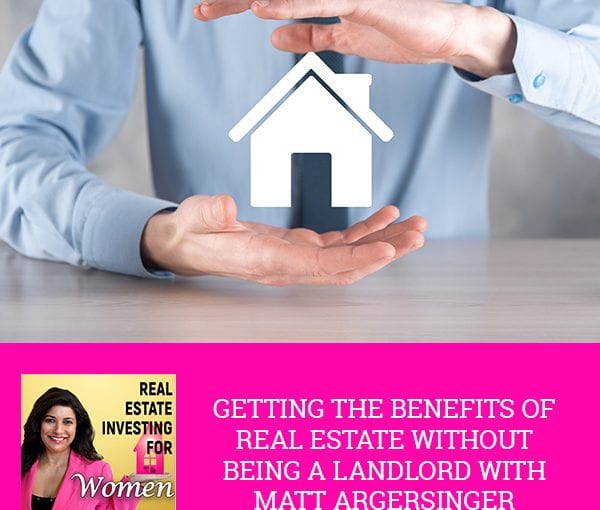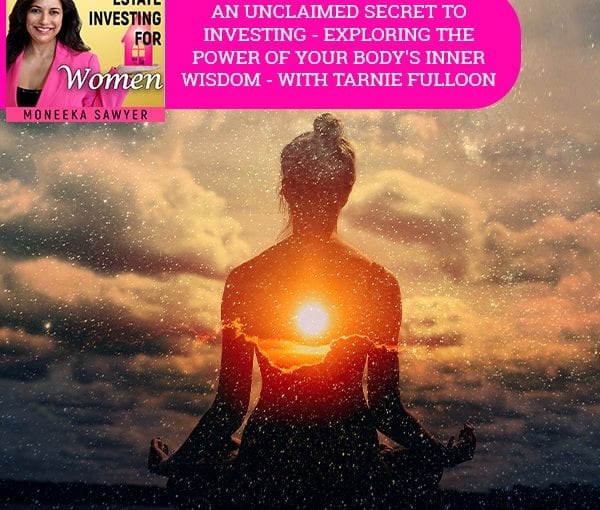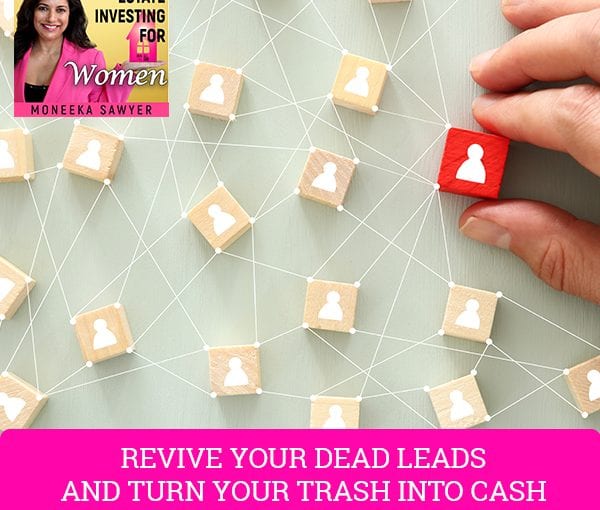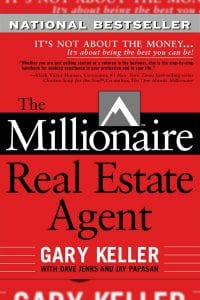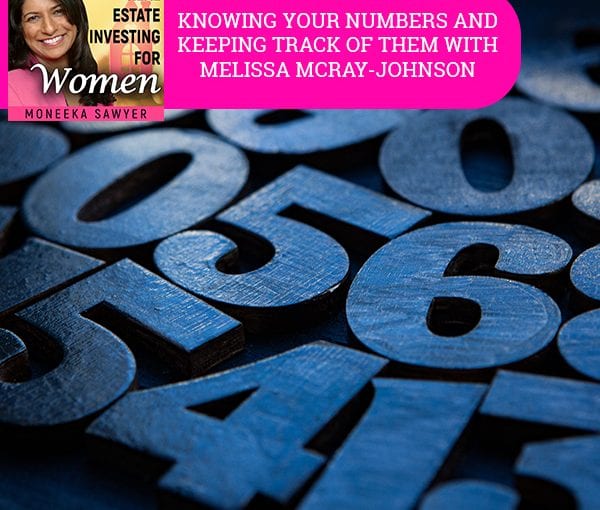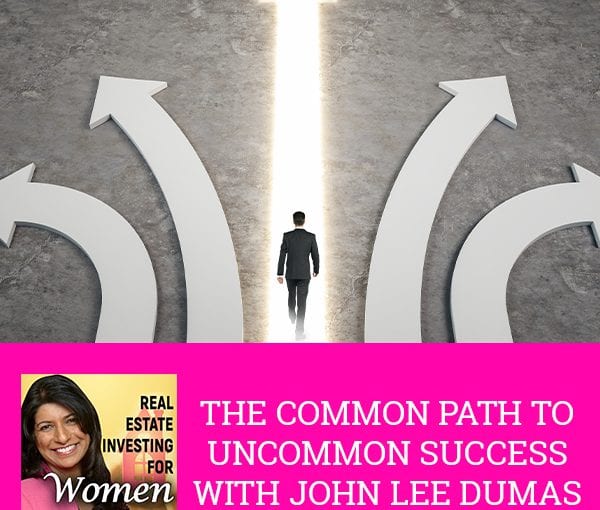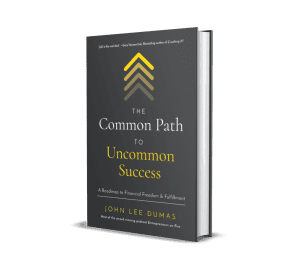Getting The Benefits Of Real Estate Without Being A Landlord With Matt Argersinger – Real Estate for Women

You can invest in real estate without being a landlord through real estate investment trusts (REITs). Today’s guest is Matt Argersinger, who joined the Motley Fool in 2008 as part of its analyst development program. In this episode, Matt discusses with Moneeka Sawyer why investing in real estate is much safer than investing in the stock market and why you don’t need to be a billionaire to start investing in real estate through REITs. It offers you the option of investing with as little as a hundred dollars! If you’re an income-seeking investor, you may want to know that REITs have a high dividend yield because it pays out 90% of the profits to investors in dividends. Excited to learn more? Join in the conversation and find out how you can start investing in REITs today!
—
Listen to the podcast here
Getting The Benefits Of Real Estate Without Being A Landlord With Matt Argersinger – Real Estate for Women
Real Estate Investing For Women
I am excited to welcome to the show, Matt Argersinger. He is the Lead Advisor of Mogul. He joined The Motley Fool in 2008 as part of the company’s Analyst Development Program. He’s worked on numerous full-investing services including Stock Advisor, Rule Breakers, Million-Dollar Portfolio and Supernova. He helped establish The Motley Fool Germany and also appears regularly on The Motley Fool Podcasts including Market Foolery and Motley Fool Money. In addition to stocks, Matt and his wife, Jean, own and manage a few income properties in Washington DC and have an interest in several commercial real estate developments.
He’s excited to use that experience and his full-investing knowledge to help Mogul and Millionacres members find the best real estate opportunities. Matt earned a degree in Economics from Brandeis University. He lives in Washington DC with Jean and his beloved King Charles Spaniel, Daisy, who we’ve heard about before. Other than hunting for investing ideas, Matt enjoys traveling, skiing, mountain climbing and board games that take at least four hours to complete. Welcome to the show, Matt.
Thank you so much for having me, Moneeka. I’m happy to be here.
Ladies, you met Deidre Woollard with The Motley Fool. She was with Mogul. Is that true, Matt?
Yes, she’s with Mogul. She’s the editor at large for Millionacres.
You heard about the amazing thing that happened. It wasn’t amazing for them. It was amazing for me. I got rated in their top ten podcasts to listen to for real estate. I did a happy dance because I’ve had this long relationship with The Motley Fool since 1994 when their very first book came out. You guys started me on my journey in investing. That’s what started the whole path to the building wealth paradigm that my husband and I have followed. You’ve been a big part of my life. For you guys to reach out to me was like God reaching out down his hands saying, “You have won. You are awesome.” That sounds weird. I don’t know how to express it. Anyway, I’m excited to be talking to you, Matt. This is fun. I want to talk about you in a second, but I want to talk about the difference between what Deidre talked about and what you’re going to be talking about.
With Deidre, she spoke about our mobile service, which is a real estate service design for accredited investors. It’s looking for deals in the private market, oftentimes, deals where you need a substantial amount of capital to get started. What I’m excited to announce is that we launched a new service called Real Estate Winners, which is designed for more beginning investors or investors looking to gain a bigger exposure to real estate within their stock portfolio. It’s a service where you can get started quickly for hundreds of dollars or thousands of dollars, no matter how much you want to invest. All you need is a brokerage account and you can get started. It’s our way of reaching out and trying to broaden the number of people who can invest successfully in real estate. Overall, what we’re trying to do with Millionacres is to help people get happier, richer and smarter through real estate investing. Deidre probably said that many times. I’m going to say it a lot too. It’s our guiding light.
Each company has their mission. You want to make sure that everybody is consistent with that mission. Give us a high level of your story of how you got to where you are now working with Real Estate Winners.
I started with The Motley Fool in 2008. I’ve worked mostly on our stock investing services at The Motley Fool. I loved it. I had a great time. I worked closely with David Gardner, one of the Founders of The Motley Fool. Over that same time when I was doing that, my wife and I were investing in real estate. We bought our first property in 2009 in Washington DC. It was a house we lived in but it also had an income property attached to it. I love telling the story because one day we bought the house. We were figuring out how to rent the property, the income apartment. My wife read this article. It was the New York Times at the time and said, “There’s this new company called Air Bed and Breakfast. They’re expanding.” Now we know that as Airbnb.
At that point, there were three Airbnb listings in all of Washington DC. We thought, “This is interesting. Let’s try renting this income property through Airbnb. People like to come to DC for short periods of time. Let’s try it.” That was successful. We listed it on Airbnb. Within a week, we were booked for six months. It was amazing. That was the catalyst for us to invest in more properties and follow that same short-term rental approach. We did that several times. Now we own several income properties in DC.
Eventually, we also were able to invest in some commercial properties. For example, a self-storage facility out in Colorado and a big apartment building that’s being developed in DC. We expanded. As I’m working at The Motley Fool, I’ve got this sidetrack of real estate investing going on with myself and my wife. A few years ago, I sat down with a few colleagues at The Motley Fool and said, “Real estate is this big asset class. It’s three times the size of the stock market.” If you add in single-family homes and commercial real estate, it’s three times the size of the stock market. It’s a huge asset class.
Through crowdfunding or real estate investment trusts, there are so many ways to get involved in real estate investing. Share on XIt’s not as volatile.
That’s right. It has all these great things. I met with some colleagues and said, “Let’s try to do something with real estate investing at The Motley Fool. We’ve been so focused on stocks. We got real estate out here. A lot of investors want to know how to invest in real estate.” That was the genesis of Millionacres. We launched the site a couple of years ago. We’ve been building new product since and trying to get more people to invest in real estate.
Thank you for that. I’m glad you guys did move into that asset class because it is huge. Deidre talked a little bit about when you look at the dynamics of how many women are investing in real estate as opposed to men, the percentages are low. There’s a huge asset class and huge opportunities on many different levels and women aren’t getting in. I’m proud to say that because of my show and several other leaders in the industry that are now women, we’re seeing a lot more women flooding in. I love it but still, we are the minority investors in real estate. I want to see that expand because of the potential.
The great thing is I feel like real estate now is more accessible than it’s ever been. It was that asset class that not just women but any individual investor who had never done real estate looked at it and said, “How do I get involved in real estate investing? Do I have to save for a down payment for years? If I ever wanted to buy a commercial property, I have to be a millionaire. There’s no way.” The beautiful thing about now is that through crowdfunding or Real Estate Investment Trust, there are many ways to get involved in investing in real estate and getting exposure to this asset class. It has a great track record over time. It’s less than half as volatile as the stock market. If you’re tired of the up-and-down swings in the stock market, real estate is certainly a great option.
I want to point something out. I had this conversation with my dad. He loves stocks and they’ve done phenomenally well. David, my husband, loves stocks and we’ve done phenomenally well. Thank you, Motley Fool. I’m not dissing on the stock market but I will say this. Unless you understand it, the volatility can get you. Let me tell you a little bit about what I mean by that. Let’s say you put in $50,000 in the stock market. It goes up to $100,000 in 3 or 4 years. It doubles, then there’s a huge crash. In 2008 and 2001, there have been some big crashes in the stock market because it was so volatile. It goes down. Let’s say it’s at $25,000. You’ve lost 50%. It feels bad because you lost $75,000. Let’s say it doubles again. Now you’re at $50,000 right where you begin, but it says that it’s doubled.
The volatility is what happens with it. The thing is the difference between the stock market volatility and the real estate market are two big ones. The first one is it’s liquid in the stock market. When that thing crashes and you have this emotional response, what do most people do? “Get me out of here. That was scary.” If the real estate market crashes, you can’t sell usually. You can file for foreclosure, which most people won’t do if they can avoid it. You’re forced to stay in for recovery. Here’s the thing. You don’t take a loss or a win until you sell. There’s forced longevity in real estate. The other thing is leverage. Let’s talk about what happened in 2006, 2007 and 2008. The stock market was going gangbusters. This happened in 2001 too just before the bust of the boom. Do I have those dates right?
Yes. Starting in 2001, the dot-com crash had started.
Before that, what happened was the stock market was going up. People were so excited and they were starting to margin their accounts. When you margin an account, what you do is you take the amount that you have and buy double the stock. You’re at 50% leverage. What happens is if you’re at 50% leverage and the market is going up, you’re making double the money. That’s exciting. What happened in the bust was that those accounts were leveraged and then the stocks dropped. The problem is when the stocks drop, all the brokerage firms need to come up with the money so they call your margin. People ended up owing hundreds of thousands of dollars on a stock they never owned fully. They owned 50%.
That’s what the problem was with the stock market. It’s not that you couldn’t hold on to good stocks. It was a lot of people were margined so they got called on that. The other thing was the freak out of, “Even though it was a good company, look at the way the stock market tanked.” Let’s compare that with what happens in real estate. In real estate, we put 20% down and we’re margined to 100%. We’re margined 4 or 5 times. What is that, Matt? Is that 4 or 5 times?
It’s 4 or 5 to 1. Usually, you keep 5% down.
If the value of the home drops, you don’t ever get called on that margin. You keep making payments. You get to hold on to that property. You get to watch it recover if you stay in. When we talk about the volatility of the stock market versus the real estate market, there are a lot of things involved in that. There are a lot of reasons that real estate is a much safer investment. I’m not dissing on the stock. We do a lot of it. We don’t margin on the stock. There are some things that we do to keep ourselves safe. Ladies, I just wanted to give you perspective because it was top of mind. My husband and I were talking about this. When you’re investing in real estate, that’s what happens. If you go with Millionacres and they’re talking about REITs and stuff like that, understand that you’re investing and somebody else who’s making those same decisions. How that works relative to volatility is still relevant.

Real Estate Investment Trust: Real estate is a big asset class; it’s actually three times the size of the stock market.
Your points are so spot on. We did a study once that looked at America’s billionaires. It turns out that none of us is a billionaire. Maybe some of your readers are billionaires. If you looked at the billionaire families that have sustained their wealth for decades, almost all of them are in real estate. They were never forced to sell and panic emotionally. They couldn’t offload their properties. They invested in properties. Oftentimes, they’d roll them over, put 1031 and save on taxes so you save on capital gains They kept rolling into real estate and holding on. That’s such a key point. If we talk about REITs for a moment, REITs are like stocks. They are traded in the public market. A lot of people will think, “What’s the difference between a REIT and a stock? It’s probably just as volatile.” They’re not.
If you look at the historical performance of Real Estate Investment Trust and the data that goes back over 50 years. Not only have they outperformed the stock market, but they’ve also done about 50% of the volatility of the average stock. You’re investing in a REIT. Most of the time, you’re getting a nice dividend out of that so you’re getting income. The stock doesn’t move nearly as sharply as your typical stock. It’s a lot easier to hold on. You’re building wealth over time and you’re getting income. I love that part of the stock market because it gives you exposure to dozens or hundreds of real estate properties. If you’re investing in a retail REIT, you’re getting exposure to hundreds of retail properties. If you invest in a multifamily REIT, you’re getting exposure to hundreds if not tens of thousands of apartment units around the country.
There are going to be downdrafts in certain markets or there’s going to be volatility in the overall market. Over time, that should build wealth. The volatility is so much less that you can sustain your investment in that and not get panicked out of it. It’s a great option for any investor. We know on the Millionacres side, a lot of people were thinking about retirement. They look at REITs as a way to generate a nice, steady income in a lower volatility part of the market. That’s one of the benefits of real estate investing.
Let’s define what a REIT is and how it works.
REIT stands for Real Estate Investment Trust. They were formed by Congress in the 1960s as a way for the average individual investor to buy into a pool of real estate. Nowadays, there are hundreds of REITs. They’re all structured so that they don’t pay taxes at the federal level. In order to qualify for that, they have to pay out 90% of their after-tax income in dividends. That’s why your typical REIT has a pretty high dividend yield. That’s because 90% of the profits from its real estate operations pay out to investors in dividends. It’s a great option for an income-seeking investor. Over time, the REIT category has grown. Now, it includes things like data centers, for example. There are data center REITs.
If you ever drive on a highway, you’ll often see a big tower that looks like it has dishes or rays on it. Those are often cellular towers. There are several REITs that only invest in cellular towers, wireless towers. As we roll out 5G and we use more data on our phones, those towers are being used. You can invest in those in Real Estate Investment Trusts. It’s expanding. There are self-storage REITs that only invest in self-storage facilities. There are all kinds of ways to get exposed to real estate. REITs are a very efficient and profitable way to do that.
The historical track record is so great. In fact, Moneeka, we look at this all the time. If you look at the last twenty years since 2000, the average REIT has returned twice the return of the S&P 500. It was remarkable. If you think about that, we had this massive financial crash in 2007, 2008, which a lot of us think was real-estate driven. It was to a certain extent but even through that, REITs have outperformed the stock market and with lower volatility. I’m biased but if you ask me where do I invest most of my money when it comes to the stock market, I tend to do it with REITs.
Give us some real and clear comparisons between investing in a REIT versus other real estate investing opportunities.
If I’m starting out as an investor and I’m thinking about where am I going to invest and I wanted to get exposure to real estate, I could invest in a rental property. That often takes a big down payment. Generally, your mortgage options on a rental property are not going to be as good as they are if you’re buying a primary home. That can be a big burden to take on. The commercial side of real estate is very big. You have to approach it with millions of dollars and it’s very expensive to get into. REITs offer you the option of investing as little as $100 or $1,000. All you need is a brokerage account. Instantly, you buy a basket of REITs and you got exposure to hundreds of real estate properties around the country.
It is probably the cheapest and most efficient way to get exposure. You can also invest in real estate stocks. Let’s think about Zillow, for example. Everyone knows Zillow. They’re publicly traded and you can say to yourself, “I can invest in Zillow. That’s a real estate company that’s publicly traded.” With that, you’re investing in a stock. Hopefully, you understand how Zillow’s business works. You’re going to face some serious volatility by doing that. I buy a REIT instead. A REIT that I’m familiar with is Mid-America Apartment Communities, which they’re the biggest apartment owner in the country. They own most of the apartment buildings in the Southeast and Southwest parts of the United States where a lot of people are moving these days. They’re a good performer over time and consistent. They pay a nice 3% dividend. That to me seems like a great way to play the real estate market rather than the high-flying or other expensive alternatives in the market.
You brought up a good point about one that you were interested in. How do we decide what kind of REITs to get into? With stocks, we all know there are a lot of different resources to get information. How do you do that with REITs?
By investing in REITs, you don’t have to be a hands-on landlord. All you need to do is sit home and collect a dividend check. Share on XThere are a lot of ways. When I am learning about a REIT, I find what I’m interested in. Go to the company’s webpage. We’ll use the example I had, Mid-America Apartment Communities. You can Google Mid-America Apartment Communities Investor Relations. That’ll take you to their website where they have presentations. They’ve got press releases and filings. You can get to know the company a little bit, the history of the company and how many properties they own around the country. One of my favorite things and it’s easy to do is if you look at the long-term track record of the stock. The ticker for Mid-America is MAA. Look at how they performed over time. If you look at MAA, over the last twenty years, they’ve delivered a great return to investors. They’ve had the same leadership in place the entire time.
You can have confidence, “I’m getting a great return from this REIT. I know I have a management team there that’s been in place for over twenty years.” They’ve been through many economic cycles and yet the stock continues to outperform. It’s a good bet that Mid-America is probably going to continue to perform well in the future. My tip is always if you find a REIT that you’re interested in learning more about, go to the website, learn more about the REIT. See how that’s done over time for investors. If you have a REIT that’s been around for at least ten years and it’s performed well, it’s a good bet that REIT is going to continue to perform well for investors. Especially if you see it has raised its dividend over time, that’s another good indicator that it’s a well-managed REIT that’s raising the amount it’s paying to investors over time. You can use it as an opportunity to earn income and grow as the stock grows.
The other thing that happens is with the stock market, we’re hearing about stock all the time. It’s culturally something that people find interesting to talk about. You might say, “I’ve heard about this company called Google and they spun off ABC. I want to check that out or this weird company called Amazon.” You hear about this culturally out there in the world but we don’t hear about REIT. Where can we go to even start? I might be interested in a REIT to do research on, but how do I even find out what I should be looking at especially if there are thousands out there? It can be confusing.
One place to start, it’s a little boring but if you look up the National Association of REITs, Nareit, they have a website. It’s not the greatest website in the world but they have a lot of information about REITs on that website. You can go check it out. There’s a lot of great information. If you want to find out some great investment ideas in the REIT space, go to Millionacres.com. That’s our free website. We have dozens of articles we’re publishing every day, at least a few each day on REITs. We have several writers who focus full-time on finding great REIT ideas and stuff in a marketplace. They’re writing articles every day and putting reports out there.
The URL to go to would be Blissfulinvestor.com/millionacres.
Start there. Nareit is a great service out there. The links you put out for Millionacres, use that as well because I think you’ll find some great timely articles on REITs if you’re looking for ideas.
When you sent me the information, it says, “Real Estate Winners’ advisors identify a select group of real estate investments and REITs that are at the heart of some of the biggest demographic and technological trends shaping society today to generated returns of 15%, 18% and even 21% annually.” Could you talk a little bit about that?
If we think about real estate, it can seem quite boring. It’s rental properties, office buildings, retail, hospitality, hotels. Some interesting parts of the real estate market are seeing tremendous change. We’ve already talked about data centers and cell towers, for example. When we think about data usage and cloud computing, there’s real estate infrastructure behind those big trends that you can invest in. Industrial is an interesting one. When the average person thinks about industrial, they think of a factory, manufacturing plant or something like that.
In real estate, there are also some interesting facets of industrial if you think about warehouse space or logistics centers. Think about how much time people are spending at home and ordering online these days. There’s real estate out there that’s benefiting from that trend. The returns you threw out. We’ve identified companies with our Real Estate Winners service that we think are benefiting from these trends. We do our projections of those returns that we think investors can get with the dividend. Those are some of the returns we’re finding.
Real estate isn’t boring if you’re earning 15%, 18% or over 20%. That’s possible out there. You have to do your due diligence, get to know the company and the management a little bit, see how they’ve done over time, and if there are some tailwinds behind it. One of the reasons I like Mid-America and keep coming back to that name is because if you think about the country at large, there’s this big Sun Belt migration going on. A lot of people are moving to places like Florida, Texas, Arizona, away from the traditional Northeast or Coastal cities. I’m looking for companies that own a lot of real estate in these places where people are moving to. I like to say, “Real estate follows people. It follows capital.”
As people move to these places and income flows to these places, real estate is going to follow. A lot of these places are underserved in terms of how many apartments they have available or other types of properties. There are some big trends out there in real estate. In 2020, we accelerated a lot of them and we’re going to see those play out in 2021 and beyond. What we’re doing in Real Estate Winners is trying to identify those trends and put money behind them.

Real Estate Investment Trust: If you’re investing in REIT, you’re going to get exposure to hundreds of retail properties.
We’re going to be talking about that, ladies, more on EXTRA. He’s going to talk a little more in detail about those trends, where they’re going to be looking, and where we should probably look in 2021 to take advantage of the trends that already have some momentum. I’m excited to talk about that in EXTRA. Talk a little bit about the premium subscription service. There are Mogul and Real Estate Winners. You have a few different things. You started by talking about that. I want more information. I want to know all about it.
Under the Millionacres umbrella, we’ve got a service called Mogul. That was the first service we’ve launched. That is what we think about as our go-anywhere real estate service. We’re looking at REITs like we talked about. We’re looking at the stock market, but we’re also looking at private opportunities. There’s this whole world of crowdfunding now. Some of your readers might have heard of Fundrise, CrowdStreet or maybe some of the other big platforms out there. These platforms are coming out with private real estate deals all the time. We wanted to develop a service that would help investors navigate these platforms and figure out what the best deals are among those platforms. With those deals, you often have to be an accredited investor. You have to come to the table with a pretty high income or net worth.
It can be pretty prohibitive. That was one of the reasons why, in addition to Mogul, we launched Real Estate Winners. Real Estate Winners is geared toward the person who’s either new to investing, maybe new to the stock market or new to REITs, or wants more real estate exposure to their portfolio and wants to do it in a very cheap and cost-effective way. That’s the beauty of what we talked about as well. You don’t have to be that weekend landlord that my wife and I spent a lot of time at. With a small amount of money, you could get exposure to some great portfolios of real estate managed by professionals. All you need to do is sit home and collect a dividend check, hopefully. It’s great. That’s what we’re trying to do. Those are our two big services behind Millionacres.
Deidre talked a lot about Mogul and that was more of the crowdfunding piece. With Real Estate Winners, which is what your focus is, that’s more of this beginner investor, which is more for REITs and that sort of thing. Ladies, I want to tell you a little bit more about how to find out more about Millionacres. You know that I’m a huge fan. You can go to BlissfulInvestor.com/millionacres. There is a free gift there waiting for you. It’s the Ten Best Real Estate Investments. Go check it out at that website. Get your free gift and start studying. For me, when I talk about blissful investing, you know that a lot of it has to do with low stress and low-time commitment. That’s what bliss feels like. Everybody can define bliss how they want to. From my perspective, it is a hands-off, high-return thing that I focus on so much. This is another one of those ways to accomplish that. Go to that website and download the report. Matt, are you ready for our three rapid-fire questions?
Always. Let’s do it.
Give us one super tip on getting started investing in real estate.
First and foremost, decide what kind of real estate investor you want to be. Do you want to be someone who’s hands-on, who likes to get their hands dirty, doesn’t mind dealing with tenants face-to-face and getting involved in real property, really challenging? If it has huge rewards, great. If you’re instead on the blissful side, you’re more of a hands-off and you want to identify some nice trends in the real estate market, decide on that. Maybe REITs or other options in the public markets are probably the places to go. That’s the first thing you do. Decide what kind of real estate investor you want to be. After that, you can find the right path to get started.
What is one strategy for being successful in real estate investing?
You touched on it earlier, which is being able to hold on. If we think about the stock market and REITs, we get excited about buying, investing and putting money into work. We get dividend checks. It feels great. What happens when volatility or the inevitable downturn comes? Being able to steel yourself against that and accept the fact that now and then the stock market is going to drop like it did last March 2020. It’s going to drop 20%, 30%. It’s going to drop fast. How you act in those kinds of moments determines how much wealth you’re going to be able to accumulate over time. If you can hold through, even take advantage of some of those downturns, you’re going to come out great. If you’re someone who can’t, panics and sells at those moments, you’re going to do some real disservice to your portfolio and returns. Emotion, I don’t know if it’s a skill or what, but it’s the hardest thing to maintain to be an investor. If you’ve got the right emotion and you can steel against those downturns, you’re going to be very successful.
I often say on this show I love Warren Buffett’s quote, “If you can’t control your emotions, you can’t control your money.” That’s what we talk about with Blissful Investing is learning how to manage your emotions so you can handle those challenging times. Even when the market has dropped and you freaked out, that you don’t live in that place. You’re able to bring yourself back to the bliss equilibrium where you can make rational decisions rather than emotional decisions. What would you say is one daily practice that contributes to your success?
Finding time to go for a walk, get fresh air and do a little exercise. My brain is always so full because I’m always thinking about things, reading about companies or working on a project. I’ve got so many things dancing in my head all the time and the idea of being able to shut it all down for a little while and go for a walk. It’s easier these days with the pandemic because here I am at home with my wife. We have a two-year-old son and being able to go spend a little time with him and clear the head, and then come back to work. A lot of us are stressed out even in non-COVID times. The ability to disconnect for a while, get some fresh air, exercise the brain and the body a little bit and come back to work. If you can do that and fit that in for at least 30 minutes a day, it has made a huge difference to me. It will make a huge difference to your readers as well.
This has been awesome. Thank you for all that you’ve offered in this portion of the show, Matt.
Thanks, Moneeka.
Ladies, we’ve got more coming in EXTRA. We’re going to be talking about the potential growth of investment classes that expanded in 2020 and have continuing potential in 2021. If you are not subscribed to EXTRA but would like to be, go to RealEstateInvestingForWomenExtra.com and you get the first seven days for free. You can take a look and see if you love it. If you don’t, no obligation at all. Thank you for joining us. I look forward to seeing you next time. Until then, remember, goals without action are just dreams. Get out there, take action and create the life your heart deeply desires. I’ll see you next time. Bye.
Important Links
- Mogul
- Millionacres
- Deidre Woollard – Past episode
- Real Estate Winners
- Mid-America Apartment Communities
- Nareit
- Blissfulinvestor.com/millionacres
- The Motley Fool
- Mid-America Apartment Communities Investor Relations
- Market Foolery
- Motley Fool Money
______________________________________
To listen to the EXTRA portion of this show go to RealEstateInvestingForWomenExtra.com
To see this program in video:
Search on Roku for Real Estate Investing 4 Women or go to this link: https://blissfulinvestor.com/biroku
On YouTube go to Real Estate Investing for Women
Moneeka Sawyer is often described as one of the most blissful people you will ever meet. She has been investing in Real Estate for over 20 years, so has been through all the different cycles of the market. Still, she has turned $10,000 into over $5,000,000, working only 5-10 hours per MONTH with very little stress.
While building her multi-million dollar business, she has traveled to over 55 countries, dances every single day, supports causes that are important to her, and spends lots of time with her husband of over 20 years.
She is the international best-selling author of the multiple award-winning books “Choose Bliss: The Power and Practice of Joy and Contentment” and “Real Estate Investing for Women: Expert Conversations to Increase Wealth and Happiness the Blissful Way.”
Moneeka has been featured on stages including Carnegie Hall and Nasdaq, radio, podcasts such as Achieve Your Goals with Hal Elrod, and TV stations including ABC, CBS, FOX, and the CW, impacting over 150 million people.
An Unclaimed Secret To Investing – Exploring The Power Of Your Body’s Inner Wisdom – With Tarnie Fulloon
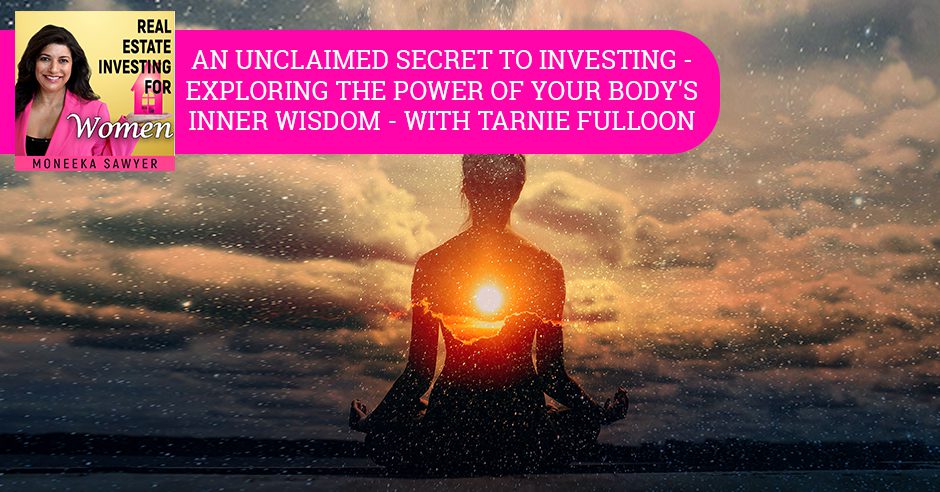
How do you use the power of your body’s inner wisdom to make wise decisions when investing in real estate? To answer that, Moneeka brings in Tarnie Fulloon, the creator of Body Centered Medicine®. Tarnie’s system is all about listening to your body so you can find your inner wisdom – that feminine energy system that guides you to make wise decisions. Tarnie and Moneeka discuss how ignoring your body’s inner wisdom generates doubt and fear that cripples you. It makes you too afraid to buy a house for yourself, making you think, “Can I do this as a woman?” In this episode, Tarnie gives you tips on how you can find your body’s inner wisdom so you can make bold and wise decisions when investing in real estate. Listen to this episode and unlock your feminine energy!
—
Listen to the podcast here
An Unclaimed Secret To Investing – Exploring The Power Of Your Body’s Inner Wisdom – With Tarnie Fulloon
Real Estate Investing For Women
I am excited to welcome back to our show, Tarnie Fulloon. Tarnie is the creator of Body Centered Medicine, a somatic healing practice that uncovers the messages the physical body is holding about how you think, what you feel, and who you are. Tarnie’s expertise lies in transforming pain and anxiety at a cellular level by uncovering the inner landscape for answers to body pain and symptoms, anxieties, and stuck places one feels in life. She is a healer, mentor, speaker, TEDx presenter, and budding author. She was also an Australian-trained sports medicine physiotherapist for the Australian Olympics 2020. She enjoys partnering with those committed to their healing on all levels, physically, emotionally, mentally, and spiritually, to empowering them to be grounded in their body, and lead from the inside out
Tarnie is a close friend of mine. We’ve known each other for years. I’ve had her on the show before. Some of you would know what she’s about, but I want to share with you that it’s been years when we met. I was making a transition in my life about what was going to be my next career. I was looking for my sole purpose and feminine leadership inside of me because I had been in such a male-dominated world that my feminine side had been lost in a lot of ways. Tarnie and I worked together. She brought back blissful Moneeka. That’s why I love Tarnie, her work, and I wanted to share her with you. Welcome back to the show.
Thank you, Moneeka. It’s lovely to be with you again.
Can you talk to us about this unclaimed secret, which is our body wisdom and why you think it’s unclaimed?
Thank you for having me on the show again. It’s fabulous to be with you. It’s unclaimed because most of us live in our heads. Most of us try and think things through. I call it body wisdom, but our inner wisdom lives in our body. We’ve been taught how to operate and think things through to feel it and know it’s challenging. We don’t trust that inner feeling. It’s unclaimed because most of us have self-doubt. we’re self-critical, we don’t listen, and we don’t know how to listen. We haven’t got the skills to listen deeply into the body. As you are doing life, it’s like, “I’ve got to think that through, and I’ve got to work that out now. What if I just took time and felt into it?” How you’ve experienced this, what’s in there, and what’s more deeply in it. It’s very much unclaimed for many of us.
Even those of us that have claimed it in the past sometimes, we lose track of it. That’s what had happened to me as I got off the path and needed someone to bring me back. You did that beautifully and strongly. Ladies, whether you feel like you already had that experience and need it to be more powerful or you don’t have that experience, it has such a big impact on how we make decisions in life and keeping things blissful because then you’re not pushing so hard, you’re more with the flow.
You’re staying open to the information that’s coming often. There’s always information coming, but we don’t keep that little inner radar open or we don’t trust it. It comes but we don’t grab it. We’re unaware of it at all. We are busily externalizing or looking out there. We don’t listen inside.
Could you tell us your story, how your journey began, and how it influenced what you’re doing now?

Inner Wisdom: We’re so busy externalizing and looking out there that we don’t listen to what’s inside of us.
I’m going to start with what I’m doing now. I created Body Centered Medicine. It’s been an evolution from starting out as a sports medicine physiotherapist, doing my Master’s in Psychology and somatic training. Body Centered Medicine is about listening or developing that relationship with our body so I can listen to it. The body reflects everything that’s going on. There’s always pain, anxiety, financial issues, decisions you have to make, relationship stuff, purpose, and work. It all is present in the body. I’ve been working for many years. I’ve been on this body centered exploration journey for many years, but it came out of my own health journey.
That started when I was a child. I had severe stomach aches and a lot of allergies. One thing led to another, I eventually ended up in my twenties in a doctor’s office, not excessively overweight but in a foggy brain and not feeling good. The work I did with starting to clean up my diet at that stage. That was the first step and then starting to explore. That started cleaning up and then I started to get much more interested in the physical body was reflecting.
People were starting to share with me emotional issues or deeper issues. I thought, “There’s something here,” so I then went on to do my Psychology training. It was my exploration of myself first, then starting to notice what was happening with my clients, and then took me to where I am. I’m deeply committed to people finding that in wisdom soul voice which is related to what you brought up, the feminine energy system that we want to activate. Most people that live in our heads don’t have access to that.
I know that you and your husband are successful real estate investors yourselves. I know that you do tap into your inner wisdom for that. Talk a little bit about how you utilize that. If you don’t utilize that or if you haven’t in the past or making investments, what might those consequences have been, give us a picture of what that looks like for your investing.
Don't beat yourself up. Be very kind to yourself. Share on XIt was in 2009 or 2008 when the market was depressed, my husband was looking at what real estate was doing. He was aware of it and was very interested. He was looking, it went months, and he was talking about it. One day, I got this feeling. I said, “Why did I come with you and start looking at these properties?” I live in Los Angeles and this was outside of LA. “Why don’t I come with you?” I did. He was talking about everything. There was a house that he wanted to pay $40,000.
The bank said no. They’re offering it at $42,000. The house is now worth $300,000. We didn’t buy that house because he was looking at flipping. I went, “What happens if we buy rental properties?” At that moment, there’s something that came into my thought. I was like, “What if we buy rental properties?” It shifted. We bought six properties quickly because we turned it around. We didn’t have to have a lot of money then. Things were like $80,000. You didn’t have to put a lot down. It was 5 or 6.
We sold one property and we ended up buying three more. One day, I went, “This isn’t feeling right for the direction we’re going where we’re looking. It feels like we’re investing too much. We’re going to be out of pocket.” He started expanding his look. We ended up in Atlanta. We did take a plane flight in November 2020. We quickly flew over there. My intuition was like, “Let’s go there, have a look, and see what we’ve got.” We bought three houses. That’s from following this inner radar. He can do the math. He’s good at working out the logistics, which is not me, but it’s my intuition, and he uses me.
I go into an area, I feel into the area, and get a sense of what it’s like. We bought one house while we were there, but we looked around the area, then we had to come home. We have to buy the other two online. That’s because I’d already felt out the area where I didn’t trust myself. I have to be very kind to myself to not beat myself up about this. My father died when I was young. I was twenty and he left me some money. I invested in real estate in Australia. I bought a house. At that time, it was $300,000. It was expensive but we had a little bit of cash.
Most of our friends didn’t have that cash because we were all young and newly married, but I did. We were 28 when we bought that house and then I got divorced. Instead of buying him out, we sold the house. Now I know I could have taken a loan and bought him out. The $300,000 is now worth $4.5 million. The same old house when we bought the one we were living in, we could have kept it and rented out. We didn’t know. We were thinking. We were following that very logical simple, sell one house, buy the next. We didn’t know about the possibility that you could expand your other options.
What’s true is that all of us make the best decisions that we can with the information that we have. What you’re trying to say here or what I’m getting is we have knowledge. We’re limited by that knowledge unless we have other friends in this industry, doing what we are doing, or wanting to do. We don’t get the advice that might help us to expand. I do think that even if you don’t have the knowledge, if you keep yourself open, in the flow, and connected to your feminine wisdom, you also become very attractive to resources. The conversations may have come to you in those times or not. Maybe that was the best thing for you and the universe was taking care of you.
We don’t know but it’s possible that if you were a little bit more open, a little bit more connected to your feminine, or trusted it. I’m speaking for myself too because I’ve made similar mistakes. I know that knowledge is one thing, but being open to the flow and to the attraction of the resources is also a big part of success. Women have so much more access to that than men because we’re naturally the yin, which is naturally an attractor. When we look at the yin and the yang, the yang is the hunter, and the yin is the attractor. If we allow ourselves to be our natural default selves and we listen, we are the attractor, and things flow and come to us.
When I feel into what you’re saying, I realized I was in a lot of fear. I was getting a divorce, but the fear sits on. That dampens it. The fear of, “Can I do this?” The self-doubt, “I’m not sure.” I realized my fear, “I can’t do that.” I also was going to buy a house myself once I got divorced. I was too afraid to buy a house for myself. It would have been $200,000 or $300,000. Those houses are now $1 million, $2 million, and $3 million. It’s not far from here. Fear stopped me as well. Can I do it as a woman? Am I confident enough?
There’s a love that dampens that feminine natural flow. Much of it is what a picture that society has painted for us that we buy into. For years, things are opening up dramatically, but even now, if you look at the numbers for investing in real estate or investing in general, women are only about 30% to 40% of the investors. Still, many more men invest. It’s because of societal support around that. Not just in our network but also what we talk about. What’s considered interesting. I remember I was having a conversation with a cousin of mine. She and her husband want to buy a house.
They didn’t have a good down payment. We were talking about options and here mom was with us. She says, “Could we talk about something interesting, please?” I have to generalize it but I was horrified like, “Your daughter wants to do something wonderful for herself and her family and that’s not interesting to you.” Some of it is not knowing, not feeling smart enough, and not wanting to engage in something that feels out of your reach or out of your thought process. It’s the way that we have conversations. You hear men in a coffee shop and they’ll be talking about what the stock market is doing or real estate. You have women in a coffee shop and they’ll be talking about the most recent book they read, which is fiction. Not bad but it’s indicative of our focus.
My mother was very clear, “Tarnie, a man is going to look after you. He needs to make the money. He’s the one that’s going to lead.” In my first marriage, I made the money and I was the provider. I provided the house but that’s from my dad. I had the income but I somehow didn’t do that next step. It’s interesting. I hadn’t done the work.
I want to be clear. Talking about books, makeup, and fun stuff is not a bad thing. It keeps us well-rounded, feminine, and it’s great. We need to develop both sides of us. Somehow, women are in this male-dominated world but we are not taking on those male interests. We’re taking on the female interests, but we’re not plugging into the flow of the feminine. We’ve got to go deeper on both sides.
We all need support. We’re not solo. How do I have a little more support around my divorce? I was over here when I got divorced, and everything was in Australia. It might’ve been a little bit different because we all need support. This is not a solo game. That’s why your show is fabulous in creating some support around you. That’s very feminine. My husband did all the figures but he needed my support for us to do the purchases. I needed him to do the figures so I could use my intuition.

Inner Wisdom: It’s very important to take time and slow down the mind. Take a deep breath and literally just find time to stay still.
Could you tell us three things that we can do to awaken, develop, and trust that feminine wisdom?
Slow Down The Mind
The very important one is to take time to slow down. It’s not just sitting down in the chair but slowing down the mind. The way to do that is to start to be aware of your breath in your body. Step number one is to slow down, take a breath, and find some still time. Some quiet. If we all took 30 seconds now to take a breath, sink into the chair, or wherever we are, stop what you’re doing for a minute, feel yourself, feel your breath in your body. As you do that, that starts awakening the sense of being in your body.
Deeper Listening
The second one is to develop deeper listening. As I take a moment to stop, I take my attention inside to a deeper listening inside. As I’m saying this, you might like to follow me. You take your awareness. A lot of us can take our awareness down into the heart but it’s dropping it down into the soft belly even to the lower belly. It’s sinking down or taking your breath and attention down into yourself. You want to develop that ability. What am I hearing? What am I listening inside to? As you develop that, when you get that gut reaction, contraction, or you get a little bit of a sharp jolt, you get a body signal or body reaction, you can feel the signal.
Building Takes Time
The third is building trust takes time. You don’t just trust something. Trust comes with time, practice, and positive reinforcement. By doing building trust every day, taking time to slow down, starting to feel and listen, and then getting a sense of, “Did I get a feeling about that? I could have said something else. I could have done something else. Did I get a feeling about that, and did I follow it?” You do a self-summary each day, or you might do something like, “What happened when I did follow that in guidance?” You’re looking for this inner guidance that lives inside the body.
It’s not just the emotional gut reaction because we can have that and that can belong to an inner child self or a protective self. There are all things that can happen in the body that are emotional. We’re talking about something a little bit deeper. They’re good indicators and they’ve got the information but where that inner wisdom is that deep knowing that lives through the core. They’re the three. Take time to slow down, develop the ability to slow down and breathe, be connected to your body, develop that sense of listening to the deepest self. Keep digging and, “What else is there? Is there something else?” Learning to trust that and doing a daily review of that.
A daily review will help you to feel that success and build the trust. I know that in EXTRA, we’re going to be talking about the actual elements of feminine wisdom and how to use them in real estate. Ladies, here are three tools that we can take forward. We’re going to talk more about how to utilize that feminine wisdom in real estate, specifically in EXTRA. I’m looking forward to that continued conversation, Tarnie.
This is not negating the masculine, the doing, and the thinking. Lots of us have got beautiful minds, well-developed, and we can think things through. I talk about my husband doing the figures but I’ve been in business for many years. I know how to hold things together. When we talk the unclaimed secret often is we’ve obviously got highly developed minds, beautiful hearts, and giving. This is about claiming another self that can help guide you, lead your life, and lead in investments in real estate.
Thank you so much for saying that because I’m hoping that the ladies didn’t get the impression that we’re negating, medializing, and minimizing the masculine energy. As women, we are lucky because we’ve been brought up in this masculine world. We’ve been taught how to do numbers, use our brains, be logical, reasonable, and all of those things. We’ve been taught all that. We have to live that way most of the time in the outside world but we also have the innate feminine.
Look at men, they have been taught to be masculine and their default is masculine. They have to struggle to get any access to the feminine. We get, by default and most is, masculine. We develop that, go to college, read, and do all of these things. We hear the conversations in the coffee shop but we also have this innate default feminine and all of those resources that we have access to that they don’t. If we can marry the two of them within us, we are powerful. Talk about limitless. Women are so powerful because we have access to so many resources easily.
Women should get together because we all need support. Share on XI do feel blessed because we have access to both. They do say women need women, and men need women.
I read something where they say, “Behind every successful man is a strong, good woman,” but also, behind every strong woman is a good woman. We need each other in the community.
That supports us in staying in this feminine conversation. We need our girlfriends. We can express emotions to them and that’s a way of accessing this deeper wisdom as well.
We’re going to head into my three rapid-fire questions. Before that, can you tell us a little bit about the free gift you’re offering my ladies?
It’s developing your unclaimed secret. You can get that at TarnieFulloon.com/ReGift.
Tell us about what it is.
It will be a meditation around developing your inner wisdom. It’ll be a meditation around being more body-centered. There’s also an offer for $100 off on either one of my workshops or a session with me. You get a gift certificate as well as you get this meditation instruction on how to develop this unclaimed secret.
Is there a way for them to connect with you or contact you?
You can either email me at [email protected]. On the website TarnieFulloon.com, there’s a little thing up on the right-hand corner on my banner that says Contact Me. You can either contact me through the website or send me a direct email.
If anything is not there, missing, or whatever, you can connect with Tarnie directly.
Call me up and I’m happy to get on the call with you for 10 or 15 minutes. Have a chat, see what you need, and how I might be able to support you. If there are some questions you have around this, I’ll be happy to talk to anyone.
Ladies, let Tarnie know that you came from me. It helps her marketing and everybody so we all stay in the community. Are you ready for three rapid-fire questions?
Yes.
Tell us one super tip on how to get started in real estate investing.
Do your homework. Make sure you find out the cost whether you can afford it. What are your parameters? What’s the maximum amount that you’re willing to spend? If you’re going to buy, rent, or flip, you’ve got to do the homework, the math, and make it financially viable. To me, that is step number one. You might like the area, do this, have all feelings, and ideas but if you don’t do the math and financial, that’s one.
What would you say is one strategy on being successful in real estate investing?
Allow yourself to do the logical stuff and then move into the feeling state like, “Is this something that I want to do? Do I want to invest in this area? Is this going to be a flip or a rental?” It’s listening to the mind but then dropping deeply in and checking in with the feeling body.
What would you say is one daily practice that you personally do that contributes to your success?
Meditate. Do that daily breath connection. I do a movement practice, but something that brings me back into the grounded sense of my being into my body and it allows me to connect to that. I connect to that in and knowing every day.
This conversation has been so lovely. Thank you so much.
Thank you. I always feel privileged to talk to you and be with you. I love our conversations, whether on or off the screen.
Ladies, thank you for joining Tarnie and me for this portion of the show. Stay tuned for EXTRA. We’re going to be talking about the elements of feminine wisdom and how to utilize those in your real estate investing. That’s going to be an exciting conversation. Stay tuned for that if you’re subscribed. If you’re not subscribed but would like to be, go to RealEstateInvestingForWomenEXTRA.com. It’s free for the first seven days. Check it out. You’ll get this EXTRA as many as you can download in seven days, and then you can either stay subscribed or not. For those of you that are leaving us now, thank you so much for joining me for this portion of the show. I hope you enjoyed it. I super appreciate you. I look forward to seeing you next time. Until then, remember, goals without action are just dreams. Get out there, take action, and create the life your heart deeply desires. I’ll see you next time. Bye.
Important Links
- Body Centered Medicine
- Show – Tarnie’s previous episode
- TarnieFulloon.com/ReGift
- [email protected]
- Contact Me tab
- RealEstateInvestingForWomenEXTRA.com
About Tarnie Fulloon
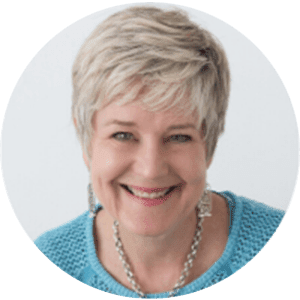 Tarnie Fulloon, transformational mentor, workshop facilitator, writer, and author, partners with professional women so they can make intimate relationships thrive.
Tarnie Fulloon, transformational mentor, workshop facilitator, writer, and author, partners with professional women so they can make intimate relationships thrive.
For more than 25 years, Tarnie has mentored women and men to heal their intimate partnerships. She guides those who are ready to reignite their relationships by accessing the wisdom and intelligence of their bodies. Her work unleashes the magnificence of full embodiment so intimacy can flourish.
For those with physical pain, often caused by blocks in relational intimacy, Tarnie’s gentle guidance shifts them to deep relief, calm, confident vitality, and joyous aliveness. She shows women the secret of showing up for themselves first so they rekindle the sparks in their intimate partnerships.
Tarnie’s BodyFreedom™ Method helps nurture intimate relationships using her proven embodiment approach. It integrates her training as an Olympic level Sports Medicine Physiotherapist (Australia), her Master’s in Spiritual Psychology (USA), and her certificate in Movement Expression.
______________________________________
To listen to the EXTRA portion of this show go to RealEstateInvestingForWomenExtra.com
To see this program in video:
Search on Roku for Real Estate Investing 4 Women or go to this link: https://blissfulinvestor.com/biroku
On YouTube go to Real Estate Investing for Women
Moneeka Sawyer is often described as one of the most blissful people you will ever meet. She has been investing in Real Estate for over 20 years, so has been through all the different cycles of the market. Still, she has turned $10,000 into over $5,000,000, working only 5-10 hours per MONTH with very little stress.
While building her multi-million dollar business, she has traveled to over 55 countries, dances every single day, supports causes that are important to her, and spends lots of time with her husband of over 20 years.
She is the international best-selling author of the multiple award-winning books “Choose Bliss: The Power and Practice of Joy and Contentment” and “Real Estate Investing for Women: Expert Conversations to Increase Wealth and Happiness the Blissful Way.”
Moneeka has been featured on stages including Carnegie Hall and Nasdaq, radio, podcasts such as Achieve Your Goals with Hal Elrod, and TV stations including ABC, CBS, FOX, and the CW, impacting over 150 million people.
Revive Your Dead Leads And Turn Your Trash Into Cash With Chris Craddock – Real Estate for Women
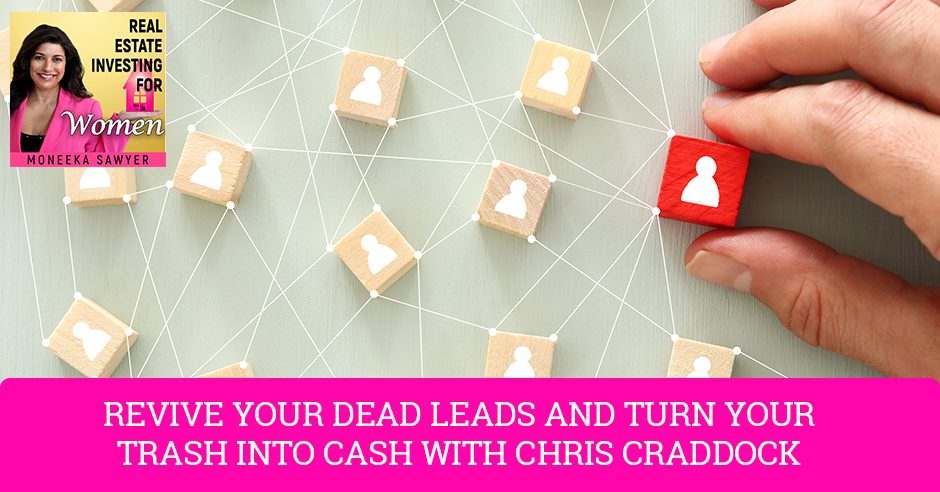
In real estate, sometimes all it takes is to look at the right places to discover the most exciting deals. For Chris Craddock, he took advantage of those dead leads that are mostly neglected and turned them into something profitable. Moneeka Sawyer talks to the mind behind the REI Revive program to discuss how to navigate such deals effectively and yield the most exciting results. Chris also talks about how important it is for an agent to think like an investor in order to perform well in the market and find the right partnerships that truly work. Finally, he shares the most helpful resources on the topic that he believes can up the game of every real estate professional today, especially when bringing back to life all those dying deals.
—
Listen to the podcast here
Revive Your Dead Leads And Turn Your Trash Into Cash With Chris Craddock – Real Estate for Women
Real Estate Investing For Women
I am excited to welcome to the show Chris Craddock. He is a nationally certified life coach and has a Doctorate in leadership. He is the host of The Uncommon Real Estate Podcast, a realtor and entrepreneur who runs multiple successful businesses in the Washington DC metro area. His team, The Redux Group, is ranked number twenty in all of Keller Williams and sold over $160 million in volume in 2020. Chris has been married for many years and is the proud father of six beautiful children.
—
Chris, how are you? Welcome to the show.
Thanks for bringing me here. I’m so excited to be with you and spend some time with you.
Persistence breaks resistance every day. Share on XI’m excited that we’re going to do it on your show too. This is going to be fun, Chris. Thank you. Let’s start by you sharing a little bit about your real estate story with my ladies.
Right out of college, I was a staff with an organization called Young Life. I loved it. It was amazing. I got paid $20,000 a year from Young Life, which was great but anybody in the DC area knows you cannot survive on $20,000 a year.
What is Young Life?
It’s a Christian ministry that works with high school kids. It was life-changing for me and I loved it. I was excited to be able to give back and be a part of it. I still volunteer now. It’s been awesome. With that said, I worked there and then, when my wife got pregnant, I knew I needed to do something to make a little bit more money. I went to the library because before Google, that’s the fountain of all information. I checked out every book they had on real estate investing. I knew nothing. I always say, “Imperfect action trumps perfect inaction any day of the week.” I read these books and did what they told me to do. That’s been a standard piece of my life. I did what they said and knocked on the doors of people in distress. In the next four months, I made twelve times what I made in a year. It was unreal and unbelievable.
What were you doing when you did that?
I found people that were going to foreclosure. I knocked on the door and said, “I’d love to buy your house.” The crazy thing was before the crash, I was able to buy stuff with 5% down. I begged and borrowed to get the 5% and brought me in a business partner. The other cool thing was when I was in college, I worked for a landscaping business mowing lawns. At one point, I was frustrated because I felt like it was poorly run. I offered to buy the business. I bought the business and ended up selling the business right before I graduated and got married. I made a little bit of money on the sale of the business, $40,000.
I flipped the landscaping business over a year. For me, as a college kid, selling it for $40,000 was awesome. I had some money there as well that I was able to use to flip the houses and parlayed that into two more deals. I kept doing ministry. I loved ministry. I stopped flipping for whatever reason. As I had more kids and the money started to disappear faster, I got back to it. During that time, I’d gone back to school. I got a Doctorate in Leadership because I loved leading people. In ministry, I led a lot of people, wherever it was. I started flipping houses again and I read Gary Keller’s MRA book, The Millionaire Real Estate Agent.
I saw how you could build a team in a serious amount of money. We looked at it again. I followed the directions, colored by numbers and started doing it. It was December 2014 when we launched that team. It took us a couple of years to grow some million. We got there through building that team, partnering with investors, being an investor myself, and all the other pieces there. That’s a convoluted way to get to where we are now.
It sounds like there’s a big focus on you building a team that then partner with investors. I recommend what most other real estate gurus will not recommend, which is work with an agent. You can buy things off MLS or if you have an agent that has access to off-market deals or whatever. In my business and in many years that I’ve been investing in real estate, my biggest asset has been my real estate agent. Without him, I would not be where I am now. I always recommend working with an agent. Nobody else does that. It sounds like you were doing it. Talk to me a little bit more about what you guys do, why you recommend that, how it works and any advice around that.
As a residential agent that also does investment work, I remember in year 2 to year 3, I did $40 million in volume one year, and then I worked so much harder. I clawed, scraped and got to $43 million that next year. I remember hearing from somebody. His story was the same. Right after that $40 million marks, he got caught. They still went ahead but worked so much harder and got less results. We said, “Here’s the deal, as the leader of the team, as that rainmaker, what you’ve got to do is stop working hard to get one more deal and figure out how you can bring in 5 or 10 more deals.”
I started thinking to myself, I’m like, “What can I do? Where are more deals?” I’m like, “Investors.” The first thing I did was go to other people that are flipping houses saying, “I’ll help you find deals.” You find one person. You help find five flips a year. You help them buy. You help them sell that ten transactions. If you find five people that are doing that, then you’re doing a massive amount of transactions. Let’s be honest, flipping houses, when you buy them and take them down, that’s a cash-intensive business, labor-intensive, and all the other stuff. You could make a lot of money without the liability and without all of the other issues coming with it. You do some of the nice ones and then sell the rest. Frankly, you have to build a massive team in order to do all of them.
Anybody that goes in business has to hit four criteria: happy, hungry, humble, and smart. Share on XI started working with those investors and then I thought, “Who else has lots of leads?” There was a massive wholesaling organization in my market. I went to them and said, “What do you guys do with the leads that you don’t buy, fix and flip, and what do you do with the leads that you don’t wholesale?” They said, “We give them to an agent. We tried all these things. We tried to start in a brokerage. We’ve given them this agent. We gave her 1,000 leads in the last 8 months, and she’s closed like six of them. It’s not a big piece of our business. It’s not worth it.”
I said, “Why don’t you give me a shot?” They’re like, “We tried it. We’re going to keep the main thing, the main thing,” which I respect. Keeping the main thing the main thing is a good point, but what I said to him, “Have you ever looked at what Jim Collins says as the “Genius of the AND” in the Good to Great You’re already doing this. You’re already paying for these leads. They’re just dying on a vine. Why don’t you give me a crack at it? I kept going back and kept saying, “We’re good.” One of the things I’ve learned in life is persistence breaks resistance every day.
Finally, they gave me 150 leads and they said, “Here you go.” I called them all, and 70 of them were already listed or sold to an investor, 30 of them were out of my area, then I had 40 leads left. I thought, “If this other girl got six deals with 1,000 leads, I’m going to need to get six deals with these.” I did everything I could. I put on the best sales that I could ever muster. Somehow, I got six listings out of those other 40 leads. I called up the main guy running their operations. I told him and he’s like, “You got six deals out of that? I scraped up some leads that were five years old because you wouldn’t leave me alone and get you to stop bugging me. I gave you a bunch of old leads, and you got as many deals. I want you to come in. Let’s pull this thing up.”
Since then, we’ve started building it up. I have a class that I teach on this. We see everybody like brand new investors. I have a wholesaler who had five months of working the wholesale. He didn’t wholesale a deal and within 45 days of doing this, he had $10,000 in referral fees coming back to him. I see that and then you see another group that has a lot of business going on. A big organization where we’re seeing them bringing in over $60,000 a month for leads that they’ve already been paying for. Three-quarters of $1 million a year, what they were already paying for that was lying dead in their database somewhere because they couldn’t flip or wholesale it. It’s life-changing for brand new investors that have a massive organization going on.
There are people that come onto my show that can match my energy. I’m completely in awe.

Dead Leads: Stop working hard to get one more deal and figure out how you can bring in 5 or 10 more deals.
Brendon Burchard says that, “The high-performers create energy.”
Why do you think other real estate agents haven’t already worked this market? Why are they not doing the partnership with the investor’s thing?
Agents and investors should go hand-in-hand, but the reality is it’s these two separate worlds where investors think agents are idiots. Let’s be honest, a lot of them are. A lot of agents feel like these investors are mavericks that do whatever they want and don’t understand the rules of the game. Frankly, some of them are. The bottom line is you go anywhere. When I was doing ministry, whenever I do premarital counseling, one of the first things I had to say to people is, “We’ve all got baggage. We’ve all got our own crazy. Can you handle this other person’s personal brand of crazy because we’ve all got it?”
You find the people that we’re going to partner with. They’re all going to have their own baggage and crazy. It’s like, “Can you handle the crazy that this person has?” That’s the way it is. Most people don’t. To me, that’s the crazy part. They’re leaving so much money on the table. Here’s the other thing. Most agents are trying to fit a square peg in a round hole, and that doesn’t work because when somebody is called an investor and wants to sell to an investor, you can’t send an agent out there and be like, “Do you want to talk to an agent?” Every single person knows 5,000 agents. Why are they going to talk to this agent? Their uncle is a hairdresser and an agent. Everybody is.
The agent has to also understand that these people called an investor for a reason and they don’t want to talk to some agent that’s going to walk out, break it, and open the listing presentation because that doesn’t work. That’s why across the country, all these investors tell me before we start a coaching program, “I tried that. It doesn’t work.” It doesn’t work when you send an agent that doesn’t understand the psychology of a person that is willing to call an investor.
Anybody that calls an investor instead of an agent wants certainty. Share on XFrom the investor side, what do you think an investor should ask or look for in an agent that’s going to be investor-friendly?
There are a couple of things. One, if you’re going to work on a program like this, anybody that you ever go in business with has to hit four criteria, happy, hungry, humble and smart. They need to be happy. If they’re not happy, wherever you go, there you are. If you see somebody that’s complaining about splits, commissions, referrals or anything like that, it’s a matter of time before they’re going to complain about you. You want somebody that’s genuinely happy and hungry. If you rip open their chest, they need to have a heart of a lion. If you get somebody that you say no, and they’re like, “It probably wasn’t a good one anyway.” That’s not who you want. You want somebody that is so hungry that you close the door and they’re climbing the window.
Somebody that won’t stop like you call the investor and say, “Send me the leads.” You bug them so much in a nice way that they still like you enough to not tell you, “Stick it somewhere.” They don’t give you 150 old dead leads just to leave them alone. You need to have somebody that’s persistently passionate and hungry, wants to win, humble, willing to sit at other people’s feet, willing to color by numbers, doesn’t think they’ve all got it figured out. If you meet somebody that’s got it figured out, introduced me to that person because I’ve yet to meet that person, and then smart.
It’s not just somebody that gets into Harvard-MIT. It’s somebody that understands EQ as well, emotional intelligence, understands how to read somebody, and how to be personable with somebody. That’s what you’re looking for in an agent. I’m reading a book called Who Not How. It is a business partnership. If you pick the right person to partner with, all the other pieces can be figured out. If you don’t pick the right person, you can give them all the information in the world, and they’re still going to squat on it and waste your whole lot of time and money.
I talk a lot about finding real estate agents that are investors themselves because that’s a big factor too. You want to be in the mind of an investor to serve an investor. You don’t want to be somebody who’s away from it. These are great tips. Thank you so much for that. Tell me about your REI Revive program and how can we find out more about it?

Dead Leads: If you don’t pick the right person to work with, you can give them all the information in the world and still squat on it.
My website, ChrisCraddock.com. You can also follow me on Instagram @CraddRock. I usually try to respond to any direct messages or DMs on Instagram. REI Revive is teaching people how to do what we’ve been doing. We’ve seen massive success. You’ve got to learn how to pick the right agent and how to hand off the leads because most people use the wrong script in handing off the leads. In the second part, you also need to learn how to sort your database because a lot of times, people are worried about cannibalizing their own leads, but they don’t realize that the reality is you had one lead followed up with for two years, but you had about 60 that would have closed with an agent and you would have made a whole heck of a lot more money.
The problem is oftentimes, emotionally, we remember that one deal where if we step back and look at it analytically, we’ll realize that we’re leaving a lot of money on the table for leads that are going to sell with somebody that might as well get paid for it. We teach that. The first half is teaching the investor. The second half is after we’ve taught the investor how to hand off everything and how to pick the right agent, we teach the agent how to close. That’s the whole thing. Agents think they know how to close, but the reality is they do their old tired listing presentation and it doesn’t work. You need to speak to an investor. Somebody that’s called an investor needs to be spoken to differently than somebody that calls a real estate agent.
Chris and I are talking about possibly creating some extra cool stuff for my ladies. Make sure that when you connect with him, you let him know you came from this show so that if we have worked something out that you can take advantage of that. Things are constantly evolving in the world and with our relationships. If you connect with anybody from this show, make sure they know you came from me, and who knows? You might get some fun surprises. ChrisCraddock.com and when you connect with him, say you came from Real Estate Investing For Women with Moneeka. We’ll see where that goes. What I love is that you first talk to and train the investor, and then you help to train the investor’s agent, which is like magic.
People that make the most money are those that solve other people's problems. Share on XThat’s the whole thing. You can train one but not the other and it doesn’t work. It requires the investor to understand how to put together their system so that you do it and scale it. It requires the agent to follow the system once they’re in front of the people, everything from the precall before you get there. Even once you’re in front of the people, how to find out why they’re there. I’ll give a sneak peek of this. Anybody that calls an investor instead of an agent wants certainty. There are 1 of 5 reasons they do it. One, they want to avoid a commission. Two, they want to sell fast. Three, maybe they’re a hoarder and they don’t want their neighbors to see pictures or see the sign in the yard or anything else. Four, they feel like their house is too much of a mess to put on the MLS. Five, they don’t want people coming through their house at all hours.
If you can answer those objections, you can sell to anybody. It’s like a doctor. I played rugby in college and destroyed both of my shoulders. Every once in a while, I would go in and get my shoulders checked because I jack them up again. The doctor will do all of these things to find the pain, then once he finds the pain, he does this thing called a crank test where he comes around like this and it’s painful. When he hears me scream, he does it again. He presses the pain point and then he presses it again. He says, “Your shoulder is jacked up again. Here’s your prescription. I want you to do physical therapy. See the orthopedist.” It’s the same thing for us. The agent goes to the seller and finds out what their pain point is. You press it and then you press it again. You then say, “Here’s my prescription. Here’s how I can solve the pain point.” The people that make the most money are the people that solve other people’s problems.
Ladies, connect with Chris. I have never met anybody who will train the investor and then train the investor’s agent. If I’m trained and then I have to go train my agent, I’m still a beginner. I can train a little bit certainly but I train a lot better now after many years when I did my first deal. To be able to do both of those things, that’s magic.
I’m excited about seeing the results that we’ve had with many people from beginners to seasoned vets that have massive businesses. It’s been fun and I love it. For me, having a Doctorate in Leadership, it took a lot to go back and get that done, but I’ve loved helping people. Zig Ziglar says, “You can have everything you want in life if you help enough other people get what they want in life.” What I’ve found is good leadership is helping people get what they want. That’s the fun part about opening this program and helping people understand like, “You’ve got hundreds of thousands of dollars in leads and CRM that you don’t realize are there.”
There’s another story that I love to share. These sawmills were milling wood but they were hardly making a profit at all, which I know a lot of investors are working their butts off, but they’re not making that much money. They’re like, “It’s around the corner.” The crazy thing is somebody got the idea with these sawmills. They’re like, “What if we were to repurpose the byproduct? What if we were to take the sawdust and be able to create candles, burn it, particleboard, all these other things you could do with sawdust?” They started selling the sawdust. They were sometimes making more money on the byproduct than they were on the wood they were milling. The same thing is true here. People are paying tens of thousands of dollars for leads but then the ones that they’re not able to fix and flip, wholesale, creative finance, or whatever they’re doing, they’re throwing it away. They’re leaving it in the CRM and they don’t realize they’re leaving mountains of cash in their CRM.
Do you recommend where people can find these leads? Let’s say they’re beginners. They don’t have the leads that they need to revive. They just need leads. Do you have resources to help people get leads and stuff too?
There are many different places. DM me and I’ll set you up with some classes. I know you’ve got a couple of questions for me that we’re going to jump into as far as some rapid-fire things, but one of them is find people that are going to help you. Find mentors because there’s no reason for you to reinvent the wheel. Find people that know the path and then followed their path. I’ve said this over and over to color by numbers. If you DM me, I’ll give you the names of some of the companies where you can find data and skip trace numbers, but here’s the easiest one. You either have money or you have time. You got to be able to invest one or the other.
If you don’t have either then don’t get into this business because you’re not going to succeed. Have time. We’ve all got 24 hours. When I got my real estate license to start the licensing piece, I got licensed in a week. I chose not to sleep that week. I stayed up late and decided to pay that price. I didn’t watch any Netflix and didn’t do anything. I did my normal job and then stayed up late and knocked out the other stuff. The bottom line is the fact that you don’t have any time is a myth. I’ll say one last thing on this. I ran a marathon a few years back. When I was training and we would have excuses why we wouldn’t train. At that time, George W. Bush was the president. He would run 5 miles every day. At some point, we were like, “If he is making the time to run 5 miles every day and he’s the president, my job is a lot less important than his. If he can figure it out, I can figure it out.”
The same thing is true for you. You decide your priorities. It’s not the lack of resources. It’s the lack of resourcefulness. A long way around, the question that you asked me originally is if you don’t have any money, it’s called driving for dollars. You drive around. You look for the ugliest houses you can find, and then you take a ping, put it in your phone, and put the address. You get 50 to 100 of those houses and then you go to any skip tracing program. You go into the data program. If you text me or DM me, I’ll give you the names of some of them that I recommend. If you go into a program, they’ll give you cell phone numbers, email addresses, everything for the people that live there. Some of them will be good, but then you can spend the next day. You take 1 or 2 hours, and you call through everybody. Your script is simple, “Are you looking to sell your house? If you’ve got the right price for it, I’d like to buy your house.” You offer to buy their house. They’ll say, “What do you want to sell for?”
Here’s another tip. There’s a book called Never Split The Difference by Chris Voss. It’s the best book on negotiating out there, in my opinion. One of the things he talks about is anchoring. You want them to give you the price. You say, “I’m interested in your neighborhood. I’m looking to see what you’d be willing to sell for. Do you have a number in mind that if me or a business partner of mine were able to buy your house that you’d be comfortable selling?” You asked in different ways until they give you a number. You don’t want to give them the number. You want them to give you the number. When they say yes, that’s great.
You get the number. You say, “Let me do my research.” Do your research, see if you can do it, you negotiate the number down, then you got your first house. Some of these other programs will teach you how to wholesale it or fix and flip, creative finance, and all the other stuff. There’s probably more than we can get into in this episode. That’s the easiest way to and the most cost-effective way to get started and find your first deal.
What do you do with them? In your program, what you focus on is building those relationships, but then you lead people to the next place, which is what they are going to do with those houses once they get them. There are a million things you can do with these houses once you’ve got one in a contract.

Dead Leads: If you don’t have either time or money, don’t get into this business because you’re not going to succeed.
There’s a number of programs that I recommend that will teach you how to get those deals. DM me on Instagram and I’ll be happy to put you in touch with some people, then we can go from there. They’ll teach you how to bring in the deals. Let’s say you’re driving for dollars and somebody says, “I’ll sell my house for X dollars,” but you look at it and like, “I can’t buy or fix and flip this. My program teaches you how to partner with an agent who can go list it and get a commission there.
There are some rules about how agents can pay commissions and referral fees. You have to figure that out and everything else. Essentially, if you find somebody that’s willing to sell but they’re not willing to sell for $0.65 or $0.75 on a dollar, then there are other ways to monetize that. Most people aren’t doing that. That’s the whole thing. You got to figure out how you want to make money. You can do anything, but you can’t do everything. You find your niche, you dive in and you get it done. I know you have a unique niche that you’re in. If everybody can find their niche, go all in and make it happen, you can make a lot of money.
Chris, remind everybody how they can reach you.
ChrisCraddock.com is the website. On Instagram @CraddRock. I try to respond to every DM. My business page on Facebook is @ChrisCraddock.
Anytime you connect with Chris, make sure you let him know you came from me. Are you ready for our three rapid-fire questions?
Let’s do it.
Give us one super tip on getting started investing in real estate.
Find somebody that’s doing it well. Spend money, buy them a nice lunch and offer to buy them. I know we’re in the COVID world, so it’s harder to get together. If you want to shorten your learning curve, you find some people that are good and do it. If they’re not in your market and you can’t find them, find somebody you listened to in a podcast, reach out to them and ask their advice. People are so much more generous than you think they are with their time. I’m going to give 1.5 tips. Buy the coaching products. Everybody’s like, “I can find this online.” You can find all of these things online, but you want to find one that’s good, that’s going to walk you step-by-step how to get your first deal. Spend the money. It’s the best money you’ll ever spend if you do it.
Go spend the money and then sit on it. What is one strategy for being successful in real estate investing?
There are two pieces, activity and skill. You don’t even have to be that good if you talk to enough people. You don’t want to any secret about it. An awful salesperson who talks to 1,000 people a day is going to outperform a great salesperson that talks to three people a day. My whole thing is activity and skill. Figure out how to talk to more people. At first, if you have no money, you do it by driving for dollars and you call. As you earn money, then you can do more marketing where you’re sending out direct mail, voicemail drops, or all of the other options that you have to reach out to people. Talk to enough people and then skill up. The way you skill up is every single day, you should never have a day that goes by where you’re not doing at least 30 minutes of personal development.
You’re reading, listening to podcasts, listening to audible books, whatever it is. I recommend an hour. I’d usually do about at least an hour a day. If you don’t have that, your business will grow and your life will go to the extent you grow. If you want to grow, you need to bring stuff in to change your mindset and to be able to think bigger. Here’s the other side. I talked about meeting mentors. I have more mentors in my life that I’m never ever met because I’ve read and listened to everything they’ve ever said. Find those people and bring them into your life.
If everybody can find their niche, go all in and make it happen. You can definitely make a lot of money. Share on XWhat is one daily practice that contributes to your success, other than reading and personal development? That was a great tip and I love that one.
Here’s the last piece, many of us had these yearly goals that we never hit. I always call this dialing it back to your irreducible minimums. If you want to win the year, you’ve got to win your quarter. If you want to win your quarter, you got to win your month. If you want to win your month, you got to win your week. If you want to win your week, you got to win your day. If you want to win your day, you’ve got to win your morning. Most people wake up in the mornings and play defense. They figure out, “What’s coming at me?” Handle that.
There’s a book called The ONE Thing. The way they define that is what is one thing that if I do this, all other things will become easier or unnecessary. If you figure out what your one thing is that you need to do that day that will move a rock, so that you win your day, so that every single day you do that one thing in the morning because if you get it later in the day, all just gets pushed to later. Do it in the morning. Win your morning, which wins your day, week, month, quarter and year.
I wrote a book many years ago called Choose Bliss. One of the very first after the intro is all about the morning routine. We all have a morning routine but most of us don’t have a morning routine that serves our day. We wake up playing defense instead of playing offense. If you plan it, you do it intentionally, and now you’ve set yourself up for what I call bliss, what you might call success, you’re setting yourself up to win the day. I love that. Thank you for that.
This has been awesome.
Chris, thank you so much for joining me on this show.
Thanks for having me. This is a lot of fun.
Ladies, thank you for joining Chris and me on the show. I look forward to seeing you next time. Until then, remember, goals without action are just dreams. Get out there, take action, and create the life you heart most deeply desires.
Important Links
- The Uncommon Real Estate Podcast
- The Redux Group
- The Millionaire Real Estate Agent
- Good to Great
- Who Not How
- REI Revive
- ChrisCraddock.com
- @CraddRock – Instagram
- Never Split The Difference
- @ChrisCraddock – Facebook
- The ONE Thing
- Choose Bliss
About Chris Craddock
 Chris Craddock, the Redux Group Team Leader, is a Northern Virginia native and father of six who has been successfully investing in real estate for over a decade.
Chris Craddock, the Redux Group Team Leader, is a Northern Virginia native and father of six who has been successfully investing in real estate for over a decade.
He is a licensed Realtor® in Washington, D.C., Maryland, and Virginia. A Nationally Certified Life Coach, Chris is passionate about helping others achieve financial and personal success.
He is known for his relentless pursuit of the best deals for his clients.
______________________________________
To listen to the EXTRA portion of this show go to RealEstateInvestingForWomenExtra.com
To see this program in video:
Search on Roku for Real Estate Investing 4 Women or go to this link: https://blissfulinvestor.com/biroku
On YouTube go to Real Estate Investing for Women
Moneeka Sawyer is often described as one of the most blissful people you will ever meet. She has been investing in Real Estate for over 20 years, so has been through all the different cycles of the market. Still, she has turned $10,000 into over $5,000,000, working only 5-10 hours per MONTH with very little stress.
While building her multi-million dollar business, she has traveled to over 55 countries, dances every single day, supports causes that are important to her, and spends lots of time with her husband of over 20 years.
She is the international best-selling author of the multiple award-winning books “Choose Bliss: The Power and Practice of Joy and Contentment” and “Real Estate Investing for Women: Expert Conversations to Increase Wealth and Happiness the Blissful Way.”
Moneeka has been featured on stages including Carnegie Hall and Nasdaq, radio, podcasts such as Achieve Your Goals with Hal Elrod, and TV stations including ABC, CBS, FOX, and the CW, impacting over 150 million people.
Knowing Your Numbers And Keeping Track Of Them With Melissa McRay-Johnson – Real Estate Women
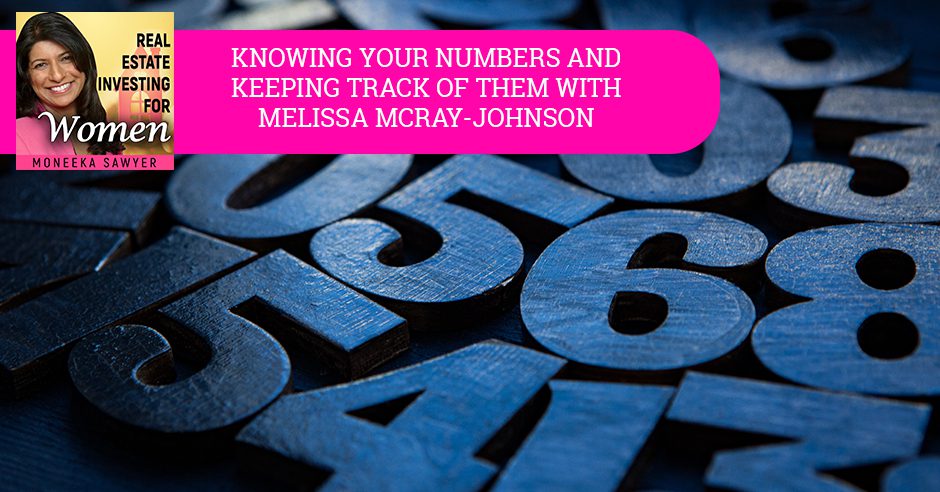
When you know your numbers, you can map the business deal in your head, and you’re able to make smart business decisions on where to spend your money. Joining Moneeka Sawyer in today’s episode is Melissa McRay-Johnson, the Founder of E3 Coaching, LLC. Melissa further explains the importance of knowing your numbers and keeping track of everything to your success. Are your numbers going where you expect them to go? Tune in and learn from this discussion on how you can stay on top of your business.
—
Listen to the podcast here
Knowing Your Numbers And Keeping Track Of Them With Melissa McRay-Johnson – Real Estate Women
Real Estate Investing For Women
I am excited to welcome to the show, Melissa Johnson. Melissa has been flipping houses in San Antonio, Texas since 2003, growing and expanding the business into a thriving real estate investment operation. With over 1,000 houses flipped, she has also built a portfolio of rental properties and real estate notes while raising five children. She provides coaching support and education for other high-level real estate investors nationwide. As a Co-founder of the San Antonio InvestHer meetup group and an active member of the Forbes Council on Real Estate and the National Association of Women Business Owners, she is dedicated to the success and empowerment of women in business. Melissa, welcome to the show.
Thank you. I’m excited.
This is going to be a great conversation. This is a marketing conversation, right?
Yes. I love marketing.
I’m excited to have someone on the show that’s an active investor who is also going to be talking about marketing. There is a lot of crossover, but most of the time I have a marketing person on the show, they’re not an investor. I’m super excited about what you have to offer to my audience. Could you give me a high-level story about how you got into doing what you’re doing?

Knowing Your Numbers: Run the numbers ahead of time to see how you can map it all out.
Back in 2003, real estate was not on my radar at all. I was always interested in real estate, but I thought maybe an agent. I didn’t follow through with that at the time. I was working for a defense contractor and my husband at the time, his father was investing in real estate. We spent a lot of time with him and it seemed like he was having this great time all the time, traveling in his RV, taking time off and getting all these doors, rental properties and stuff. I’m like, “That’s pretty cool.” We talked about it and said, “Why don’t we try it? This could be something good for us.” It sounds fun. It’d be great to be our own boss and get out of the cubicle life. We started down that road pretty simply at first, doing it part-time while we were working. Eventually, my husband ended up getting laid off because we worked for the government and there were issues with contracts and stuff like that. It’s two weeks before our wedding, so I wasn’t freaked out at all. I was.
We rolled with it and we thought, “Maybe this is a push, we needed to do this full-time.” He went full-time. I stayed at the job for about six more months was about all I could handle. Before the jealousy, “This isn’t fair. I don’t want to be sitting at this desk, you’re out running, having fun and I’m here. It’s miserable.” I then quit. I have pretty much been doing that ever since doing different exit strategies. I have been rehabbing for many years, I’m building a portfolio again of the rental properties. I love notes, creating notes. The last few years I have been more focused on wholesaling because it has seemed to fit well with the way the market was going and stuff like that. A little bit of everything I’ve done throughout the years. I’m still real estate investing, but I am also moved into more of a coaching and mentoring space, which I’m enjoying. That was born out of this whole COVID thing. Time to reevaluate life, “What do I want to do?” I got divorced. That was a rough thing to go through. It was a time to reevaluate everything. Things are looking good now.
Tell me, what do you mean by you create notes?
I know a lot of people having rental properties and things like that, but I love doing seller financing and creating notes from that. It’s a great way for you to get passive income without all the headaches of the rental properties. With rentals, you’ve always got to worry about maintenance and there are taxes. Those calls, “Something is broken,” and the big-ticket things that have to be done. Maintaining all that stuff is a lot. What we found was that by creating notes, you’re still getting that passive income, except you’re making money now in a cool way because you’re collecting interest. You’re not on the hook for taxes or insurance. I hold back escrow for those things. That strategy has been nice, but I do have rentals too because it’s good to have a balanced portfolio, rentals for the depreciation, things like that. The notes for creating that long-term stuff. What I liked doing is creating these notes, buying a property on a very short-term note for me, and then selling it on a 30-year note to an end buyer. Once my short-term notes paid off, it’s all gravy after that.
Take the time to reevaluate your life. Share on XWhen you purchase it, you have the seller that’s selling it to you, carry back the note?
No. I get my own financing and what I do is it’s called a wrap. It’s a wraparound mortgage. I’ve got a very short again, like a five-year note for that property. I’ll buy it. I’ll fix it up and then, be into it for X amount of dollars. I turn around and sell it for full retail to an end buyer, charge more interest than what I’m paying so that my payment is always covered every month. I don’t make a whole lot initially, but after that five-year period, then it’s free and clear. It’s checks in the mail every month.
I’m sorry to delve in. We weren’t planning on talking about this, but it’s so cool.
It’s one of my favorite exit strategies.
Let’s say for instance, you purchase it, you get financing and you’re going to pay it off in five years. Let’s say for the sake of argument, you might get a loan for 3% or 3.5%, then you’re going to sell that on a 30-year note. I know that this is not your number, as you can tell me if I’m correct or not, but something closer to 7% or 8%. If you’re selling that note at 7% or 8%, does that cover the payment of your shorter-term note upfront?
That’s what I always want to make sure that is happening, but yes. I’m buying at a such a deep discount. I’m into the property for so much less than what it’s selling for. I make sure when I run all the numbers when I run out of the scenario, I want to make sure that payment is covered because I’m collecting a down payment too from those end buyers also. That’s putting cash in my pocket too, which is nice. Their mortgage is always covering mine as a minimum. Sometimes there’s more. I make more, but I never pay less if that makes sense. I know in my mind I can run the numbers ahead of time to see I can map it all out. That’s part of the deal analysis, buying these things to make sure that, “If I buy this property for this much into it, I know my interest rate is this much. I want to finance it for this long and it’s going to sell for this much at this interest rate for this amount of time.” I can check all those numbers ahead of time before I even buy the house to make sure.
How much down payment do you usually take? Is it a percentage or is it what they can afford? How do you determine that?
It’s what they can afford. There are a lot of different ways of doing it. I don’t do super-expensive houses. I’m trying to do those deals in certain areas where it’s hardworking middle-class people. They want to own a home. Maybe their credit is not that great, or they can’t get a loan from a bank traditionally. Although I always tell them if you’re able to qualify down the road, feel free, go refinance. They can refinance at any time through a bank and get a lower interest rate when their credit improves or whatever and then I get cashed out. It’s a win-win either way. That’s the approach there.
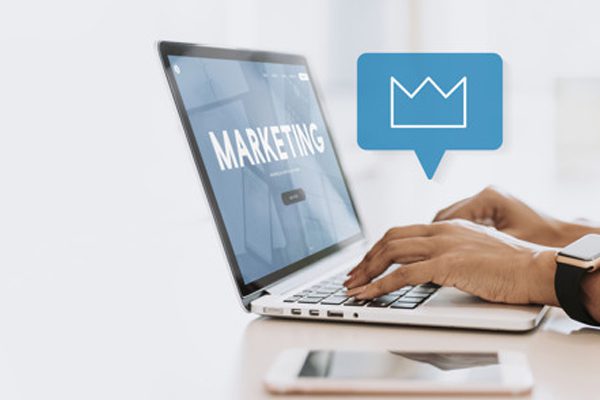
Knowing Your Numbers: You can be creative with your marketing. It’s fun to try, test, and measure new things.
How do you get the houses? Do you get them through auction or do you have a strategy around that?
All of my marketing is all direct to sellers. I don’t buy off the MLS. I don’t buy from other wholesalers. I’m not buying at auctions or anything like that. It’s strictly direct from sellers.
That gets to the marketing piece. The conversation has been fascinating so far just about to get better. Talk to us a little bit about marketing for investors and what that looks like.
It looks amazing. I love marketing. I love it because it’s creative. You can be creative with your marketing. It’s fun to try, test, and measure new things. That’s always a cool thing to do. I like being very focused on marketing. Some people will do direct mail and they’re like blasting stuff out all over the place. I did that for a while and that shotgun approach works sometimes, but I’ve learned over the years, how to be more focused with things and how to tighten things up. I like stuff simple, efficient and very clear. That works in all aspects of my business, especially with marketing. What I’ve done is chosen certain marketing channels to do and then tracking all of those things.
Marketing is cool because there are many aspects to it. You can launch a campaign and maybe you get nothing. You can launch another campaign and it rocks. It’s like, “What worked? What didn’t work? What am I measuring? Do I need to change my message?” There are many different pieces to it. If something is not hitting, it’s like, “Am I not hitting the right people? Is there something wrong with my message?” A lot of different things play into that. It’s very important when you’re doing marketing to pick those few things and make sure you’re tracking them to see how they’re working because marketing is where we spend most of our money. Without marketing, you get no leads. You have no deals and then you have no business. Marketing is critical.
Tell me a little bit about the specifics. Where do you market or how do you do that marketing? Give me a little bit more detail on that.
I’ve done a lot of things over the years and what I’ve noticed is that things come and go. Something that works ten years ago isn’t going to work now necessarily but it could come back. I tell clients this all the time, like with direct mail. It was good for a while and then, it wasn’t so great. Now, it’s making a comeback again. We used to do billboards and Yellow Page ads. Yellow Page ads were kicking back in the day. We get a lot of deals out of this.
For people who are like, “What’s the Yellow Pages?”
“Isn’t that online?” These are like the straight-up phone book where you just turn the pages. That was a very effective marketing technique back then. Not so much anymore. I love online marketing. That’s been a big one for us. I’m back to direct mail again. Those are the two biggest places that I like to spend my time and referrals. I love referrals. Once you’ve been doing this for so long, because I’ve been doing this for many years now, so you build a reputation over that time. The great thing about that is you’ve sold a lot of houses in that amount of time. That’s a lot of people you’ve reached that are right for referrals. The last couple of deals that we’ve got have been strictly from referrals, not from any specific marketing that we’ve done, from them having a great experience. We were very conscious about the experience that we give the sellers.
When you're first getting started, always start simple. Share on XWe make sure we communicate with them all the time and things like that. When you get that good experience, you get a good referral. If I get a referral, I’ll film $500 as a thank you. They’re not going into it with the expectation. They’re going to get anything, but it’s a great place to get more deals is through your referrals. Referrals, online, and direct mail. I like to play with all those three things together. Even when I’m doing a direct mail campaign, I’ve always got links to the website and things like that in there and vice versa. With the website, I’m always trying to provide information, good content, and things like that. It all works together. I’ll use those things from the website and the direct mail too. I’ll pull a testimonial. If I’m hitting probates, I’ll pull a testimonial from probate and put it in the mail piece. It all works well when you use them all together.
Talk to me a little bit more about online marketing. You have a website. Tell me a little bit more about how the whole thing works.
Nowadays, you have to have an online presence. It’s tough to have a business when you don’t have an online presence because that’s where everybody goes now. They don’t go to the Yellow Pages anymore. If they want to know about you, they’re going to search online. That’s the first place people go when they have a problem that they need to solve, they’re going to go online. If you are present there, you’re already a step ahead of people that don’t have a website or a web presence. It’s important to have that there. It’s important to have a very easy-to-use website that people know what’s happening. They know the steps of the process. It’s very easy for them to contact you. We get a lot of leads online. You can do it organically or you can throw money at it. If you’re doing AdWords or PPC, you can do things like that to help boost. Also, social media marketing, Facebook ads and we’ve done it in the past. You just got to be online.
The thing is your whole online strategy is to have a website and drive traffic. How do you analyze your marketing and pivot? You analyze it. You need to look at some stuff. Tell us how you do it and what’s important to analyze?
I’m old-fashioned, I guess. I have this spreadsheet that I use to track my marketing and I use it with my CRM system. What I’m tracking are all my leads to come in. I want to know what leads came in. What source channel did they come from? Was it from a direct mail campaign? Was it from a website? Was it a referral? Was it a realtor lead or something? Was it from networking? Was it a wholesaler lead? Whatever that is, I have it all broken up that way. I want to know what leads are coming in and then which leads are good leads. You think it’s a lead because you got a phone call, but what if it’s spam or if it’s a, “Take me off your list?” That’s not a lead.
Those numbers can get skewed very quickly. It’s like, “I got 57 leads or whatever,” but half of those were spam or junk. It’s important to know if they’re good leads or not. From that then, I’m tracking, I want to know, “What did I spend? What was my cost per lead? What was my cost per deal? What were my conversion rates?” We got these many leads. We got these many appointments. How many of those appointments turned into actual contracts? How many of those contracts turn into closed deals? What do we spend for all those? I’m also tracking profit on those too because I want to know what’s my profitability for each of those marketing channels. That gives me a better picture of the ROI.
Fallout too, you want to track your attrition rates too because some marketing channels have a higher fallout than others. I get a lot of data from that. I’m able to make smart business decisions on where to spend my marketing dollars. “Do I need to spend more here because it’s working? Do I need to cut back somewhere?” That’s what I’m tracking and why that’s important. What I use that for is to make smart decisions about where I’m spending that money.

Knowing Your Numbers: Marketing is critical. Without marketing, you get no leads, have no deals, and have no business.
Talk to me a little bit about crafting the message that you’re getting out there and how you do it for the different channels, whether you’re online, you’re doing a mailer or whatever.
What I do is I like to think about the person that’s going to get these pieces of mail. You should always have in mind who you’re talking to and this is with any marketing, it doesn’t matter what you’re doing. I find that people aren’t taking that in and bringing that into the real estate world. You hear about it when people are doing every other marketing, but why aren’t you building a persona for your real estate business? What I started doing was that very thing, figuring out, “Who am I talking to?” Crafting a message that speaks directly to them. I just wrapped up a probate mailing and it was finishing up. It’s a drip campaign of messages that are very specifically tailored to people that are in that situation.
Once you figure out what other pain points are and things like that, if you craft a message that resonates with them, the odds are higher that they’re going to contact you or at least be in front of mind when they are ready to make that decision. Sometimes people don’t always make a decision right away. We know from research that it takes 6 to 7 touches with a direct mail campaign before somebody is going to reach out to you. It’s going in with a consistent message that builds on top of the message before that until it ends in a point where, “What are you going to do if you don’t sell this house? Let’s think about that.” Having a good message that’s specific to what they’re saying and telling them how you’re going to solve their problem too in a very simple way. Keeping it very simple and not overloading them with too much information.
You mentioned a drip campaign, define that for my ladies, for anybody who doesn’t know that marketing term.
It’s a regularly scheduled campaign. We know we’re going to hit them with this mail piece first because this is like, “This is who I am and if I can help you,” it’s like an introductory thing. Four weeks later comes the next message. A little bit different and talking about something else but still related to their situation and then four weeks after that. That’s what a drip campaign is. It’s that having a very systematized setup way of releasing those pieces out to people.
Thank you for that. Tell us about the websites. What should we have on the website in order to bring in the leads that we’re looking for?
You want to have a website and not just a landing page. A landing page could work too, but having a full-on website where you can separate the information out a little bit for them. What I found is keeping it clean, keeping it simple. A very clear call to action, you want to have on your website. Anywhere they go on that website, you want to make sure that there’s a spot for them to contact you. You don’t know what they’re going to be scrolling through and see and say, “I relate to that. I understand that,” or, “That makes me want to do something.” The buttons right there for them to contact you. You want to make sure that you’re doing that. You want to make sure you’ve got the forms to capture their information. You also want to make sure that the most pertinent information is above the fold.
What that means is you don’t want them to scroll past. When you go to a website, whatever’s pops up on the site before you even start scrolling down, that’s above the fold. You want to make sure you capture their attention right there. You want to have that call to action big up there. You want to have a form for them to fill out, to submit their name and information. I don’t recommend putting any other social links up there because you want them to stay on your site. You don’t want them bouncing off somewhere else to your YouTube channel right there and then. That’s not good. If you can have a video above the fold, that helps with rankings. There are a lot of things you can do with SEO and stuff to get your website to rank. The video is important. If you can have a well-done video, it doesn’t have to be professional or anything like that, but some video that talks about who you are and what you’re doing and how you’re helping people. That’s a great thing to have on there.
Anything else people should keep in mind?
For their website?
Yes.
I would say if you can have testimonials on your website because that’s very important. People can see, “Here are some real people that you’ve helped,” so that’s good. Anything you can do to have credibility, especially now, there are so many fly-by-night people out there doing stuff. The more you can show that you’re a legitimate business, you know, and that you’ve got some credibility, so maybe a Better Business Bureau symbol. I forget what they call it. If you get registered with the Better Business Bureau, then you can use that on your marketing pieces. That’s been good for us just being able to say, “We’re A-plus ranked on Better Business Bureau.” Having a Google business page is good also. It helps you with your ranking and shows people where you’re at. When you google something like, “I need to sell my house,” and wherever you’re at you’ll pop up there on the map or on the sidebar or whatever. Those are good to have too.
Do you have any other marketing super tips?
Track everything. I can’t stress that enough because sometimes you think things are working, but when you drill down and start digging into that stuff, things that you thought were working might not be working as well or could be working better. Make sure that you track. Find some system to track everything that you’re doing for marketing.
Do something every day that helps you move forward. Share on XMelissa, tell everybody how they can reach you.
I have a new website that launched not too long ago. It’s TheMelissaJohnson.com. On there, there’s information about me. If anyone wants to reach out about coaching, I have a podcast that I’ve launched. That’s up there. There are going to be some more resources and freebie, things that I’m working on putting up too. There are lots of info there. All my social links are on that website also.
Thank you, Melissa. That was awesome.
Thank you.
Ladies, before we go into our three rapid-fire questions, I want to let you know that Melissa and I do have an EXTRA plan. What she wants to share with you is how to build a business that fits your lifestyle. Most flippers that you hear from their businesses own them. She’s managed to do this by having five kids and all this other stuff. She’s figured out the whole building a business that you own rather than it owning you. We’re going to be talking a little bit more in-depth about that in EXTRA. I’m excited about that. Melissa, tell us one super tip on getting started investing in real estate.
When you’re first getting started, I always say start simple. There’s no need to go out and try to master every single exit strategy. I always recommend, pick a few marketing techniques. Pick a couple of exit strategies that you might want to do. Keep it very simple getting started because there’s so much out there and it’s easy to get overwhelmed. Keep it simple. That gives you the opportunity too to master what you’re doing. Cheap, low-cost marketing, become the master of that, and then build on top of that as you grow.
What would you say is a strategy for being successful in real estate investing?
Track everything.
We didn’t get that message at all on the show.
When I say track everything, treat it like a business. Make sure that you are treating it as a business because it is. Many people are just doing stuff and they’re not tracking anything. Document those systems and processes. I can’t say enough how important that is to do, because even if it’s just you, you need to know what’s going on at all times. You can’t delegate something that you haven’t documented already. Get it out of your head, document, track and measure everything.
Melissa, what would you say is one daily practice that contributes to your personal success?
For me, it’s making sure that I do something that moves my business forward every day. Maybe I do that thing first thing in the morning, maybe it’s late at night but I always make sure that there’s one thing on that list that I’m doing that is something that’s going to move the needle forward. Not being in the weeds but move the business forward.
Melissa, this has been amazing so far. I’m so excited about EXTRA. Thank you for what you’ve shared so far.
You’re welcome. It was so fun.
Ladies, thank you for joining Melissa and I for this portion of the show. We’re going to be talking about how to create that business that gives you the lifestyle you want. I’m super excited. If you subscribe, stay tuned, if you’re not but would like to be, you can do that at RealEstateInvestingForWomenExtra.com. The first day of seven days is free. You can check out this EXTRA and as many others as you can download in seven days and see if it’s for you. For those of you that are leaving Melissa and I now, thank you so much for joining us for this portion of the show. I look forward to seeing you next time. Until then, remember goals without action are just dreams. Get out there, take action and create the life your heart deeply desires. I’ll see you soon.
Important Links
- InvestHer – Facebook
- TheMelissaJohnson.com
- Podcast – Melissa Johnson’s Podcast
- RealEstateInvestingForWomenExtra.com
About Melissa McRay-Johnson
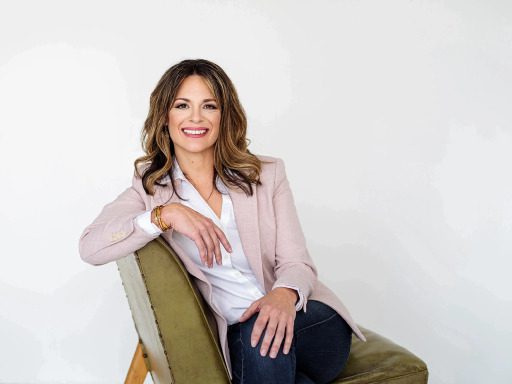 Melissa Johnson has been flipping houses in San Antonio, TX since 2003, growing and expanding the business into a thriving real estate investment operation. With over 1000 houses flipped, she has also built a portfolio of rental properties and real estate notes while raising five children.
Melissa Johnson has been flipping houses in San Antonio, TX since 2003, growing and expanding the business into a thriving real estate investment operation. With over 1000 houses flipped, she has also built a portfolio of rental properties and real estate notes while raising five children.
She provides coaching, support, and education for other high-level real estate investors and business owners nationwide. As co-founder of the San Antonio InvestHer meetup group and an active member of the Forbes Real Estate Council, and the National Association of Women Business Owners, she is dedicated to the success and empowerment of women in business.
Melissa also recently launched the E3 Podcast on iTunes where she highlights everyday women and the struggles, lessons, and wisdom they encounter as entrepreneurs.
______________________________________
To listen to the EXTRA portion of this show go to RealEstateInvestingForWomenExtra.com
To see this program in video:
Search on Roku for Real Estate Investing 4 Women or go to this link: https://blissfulinvestor.com/biroku
On YouTube go to Real Estate Investing for Women
Moneeka Sawyer is often described as one of the most blissful people you will ever meet. She has been investing in Real Estate for over 20 years, so has been through all the different cycles of the market. Still, she has turned $10,000 into over $5,000,000, working only 5-10 hours per MONTH with very little stress.
While building her multi-million dollar business, she has traveled to over 55 countries, dances every single day, supports causes that are important to her, and spends lots of time with her husband of over 20 years.
She is the international best-selling author of the multiple award-winning books “Choose Bliss: The Power and Practice of Joy and Contentment” and “Real Estate Investing for Women: Expert Conversations to Increase Wealth and Happiness the Blissful Way.”
Moneeka has been featured on stages including Carnegie Hall and Nasdaq, radio, podcasts such as Achieve Your Goals with Hal Elrod, and TV stations including ABC, CBS, FOX, and the CW, impacting over 150 million people.
The Common Path to Uncommon Success with John Lee Dumas – Real Estate for Women
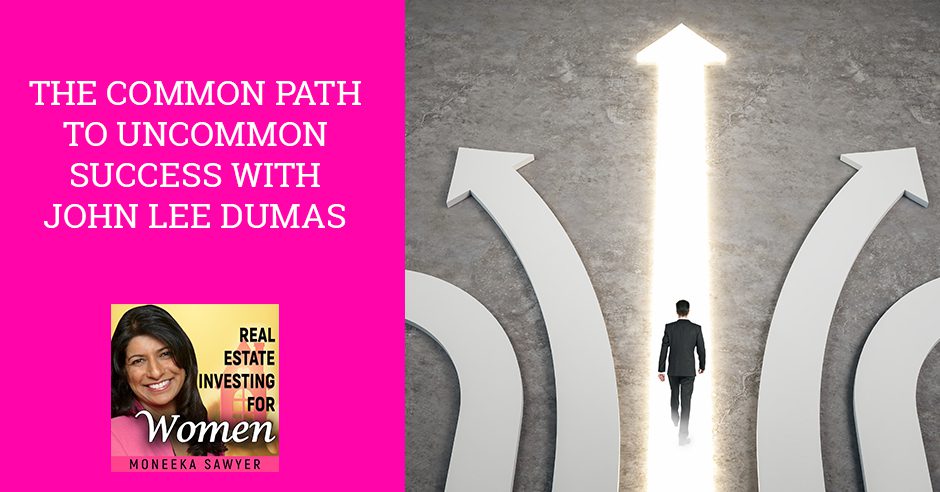
The path to success is not hidden; it’s well-known and well-worn. You simply need a roadmap to help you get there more quickly. This is the message of The Common Path to Uncommon Success, the first traditionally published book by John Lee Dumas, founder and host of the award-winning show, Entrepreneurs on Fire. John’s book is a seventeen-step roadmap to achieving financial freedom and fulfillment in your life. Want to get more glimpses of the book? Listen in to his comeback chat with Moneeka Sawyer so you, too, can learn how to walk the common path to uncommon success!
—
Listen to the podcast here
The Common Path to Uncommon Success with John Lee Dumas – Real Estate for Women
Real Estate Investing For Women
I am so excited to welcome you back to the show John Lee Dumas. He is the Founder and host of the award-winning show, Entrepreneurs on Fire. With over one million monthly listeners and seven figures of annual income, JLD is spreading entrepreneurial fire on a global scale. His first traditionally published book, The Common Path to Uncommon Success, is available now for pre-order at UncommonSuccessBook.com. John, welcome back to the show. How are you?
Moneeka, I am fired up. Your energy is next level. I love your laugh. I’m so happy to be here.
I asked you to come back to the show because I’m excited about your new book, the title is?
The Common Path to Uncommon Success: A Roadmap to Financial Freedom and Fulfillment.
The reason that I brought you back, I want to tell a quick story. When I was sixteen, I was a foreign exchange student in India. I remember going to the book markets. One day, I bought four books that changed my life. There was Think and Grow Rich by Napoleon Hill, How to Win Friends & Influence People by Dale Carnegie and The Power of Positive Thinking by Norman Vincent Peale. There is a secret book that I’ll tell you about later. Anyways, those books started my journey towards personal development and the idea of being in business for yourself.
The path to success is hard work, but it's a very common path. It's not complicated, hidden, or scary. Share on XNow, when I go back to read them, they feel very old school. I’ve been looking for the newer versions of these books to re-motivate and re-inspire me. What I love is with Think and Grow Rich, it was all about Napoleon Hill doing interviews. You are like the interview guy. You have interviewed thousands and thousands of super successful people. It’s like the next level. That’s why I’m so excited about talking about this book. Thanks for coming on. What I want to start with is, tell us why you think people have been lied to by experts out there in the business world.
This is the reality. There are amazing experts out there in this world. You just named a number of those authors who are spreading amazing, great content and helping so many people. At the same time, there are some so-called experts who aren’t quite doing that. Here’s where the red flag comes in. When you hear somebody tell you that, “The path to success is secret, hidden, and complicated, but I have the key to your success. For $1,997.97, I’ll unlock that key for you.” That is a red flag. I’ve interviewed over 3,000 successful entrepreneurs. I personally have been a successful entrepreneur for almost a decade now. I’ve been running a multimillion-dollar a year business for several years.
I know that the path to success is hard work, but it’s a very common path. It’s not complicated, hidden and scary. It’s a common path to get to your version of uncommon success. I am passionate about letting people know what that path is. That’s why I wrote this book. I sat down and said, “I’ve interviewed over 3,000 successful entrepreneurs. What are the commonalities that all of these entrepreneurs share with each other?” When I boiled it down, there were seventeen core foundational principles that every successful entrepreneur share with each other.
I decided to say, “This is a step-by-step roadmap to financial freedom and fulfillment.” I put it in chronological order and created this book, The Common Path to Uncommon Success. It is that seventeen-step roadmap to financial freedom and fulfillment. I wrote every single word, 71,000 words, 273 pages. It took me 480 writing hours. I did it and I’m proud of it. I want to get this book into your hands so that you can have the gift of financial freedom and fulfillment so that you can have the gift of living your version of uncommon success.
Tell us a little bit about what we’re going to find in this book that I’m comparing it to. Think and Grow Rich was more about philosophy. My understanding is that yours is more about strategy. Is that true?
It’s 100%. There are enough books about motivation and inspiration out there. There are fantastic books. That’s not what this book is. This book is a step-by-step strategic book. This book has every single step in the process that you need to achieve financial freedom and fulfillment. You’ve got to put in the work. It’s going to be hard. It was hard for me launching this business and putting in the work to make this happen. Every one of the 3,000 entrepreneurs that I’ve interviewed has had to put in hard work. What’s also hard is being broke, living paycheck to paycheck, waking up every morning being miserable, going to a job that you hate. That’s hard too. Why don’t you choose your hard? Why don’t you choose which hard you’re going to choose? If you don’t choose this hard of building a business, you’re choosing the other hard by default, which is living a life that’s less than you’re capable of living. Potentially, miserable, broke, and living paycheck to paycheck. You don’t need to choose that hard. You can choose your hard. This is the book that will get you there. This is the seventeen-step roadmap.

Uncommon Success: If you don’t choose the challenge of building a business, you’re choosing the other option by default, which is living a life that’s less than you’re capable of living.
I know on your show I mentioned this quote. I love saying this quote all the time. My dad, when I was 21, shared with me something that completely changed my life. He said, “Everybody has stress, fear, and money problems. Do you want poor people money problems or rich people money problems?”
I got a money problem, but the rich people money problems.
They’re good money problems, aren’t they?
Yes, they are. They’re still problems. They’re better than the alternative.
This is the same thing with success. There’s a lack of success problems and successful people problems. On this show, I don’t talk about life being hard. We talk about life being blissful. Part of being blissful is being willing to put in the work to make your life what you want it to be. If it’s hard work, for me, I love to work hard when I’m super passionate about something.
By the way, Moneeka, that brings up a good point because that’s exactly what step one, chapter one is. Most people will never identify this in their life. What is that? Their big idea. Your big idea is buried within you. We need to take it out. It’s your big idea and zone of fire. You can live in that zone of fire every single day. Like Moneeka said, you wake up and you’re still going to work hard. You’re going to work hard doing something you love, you’re passionate about, that fires you up and lights you on fire. If you’re going to work hard either way, why not it be something that is your big idea, your zone of fire? That is what step one, chapter one is, identifying not Moneeka or JLD’s big idea, not being a pale, weak imitation of somebody else’s big idea, but your big idea. There’s a big idea inside of all of us. Let’s get it out.
Tell us a little bit more about what we’re going to find.
Let’s move on to chapter two. This is the thing that a lot of people are surprised at. They come up with their big idea. They’re excited and they should be. It’s a big idea. It’s a good idea, but other people have had this good idea. There’s a lot of people in this world. It’s a good thing that other people have had your big idea before because that’s proof of concept. That means that your big idea is a great idea. It’s viable. That’s awesome. You can’t though, now with this entrenched competition out there, go like a lamb to the slaughter and enter into the market of where your big idea is. You will get crushed. What you need to do is get initial momentum and traction. How you do that is step two, discover your niche.
You need to find the void in the marketplace that’s not being filled and fill that void. You need to find the place in the marketplace that’s not being served and serve it to the best of your ability. By the way, you should become the best solution to that one, single niche problem. I teach you how to do that in step two so that you don’t go out and get walloped by all the competition out there in this broad, vague idea of yours that’s a good one. We’ve got to start small and then we plant a seed. We crank a little wedge in there and then we crank it out.
My big idea was a podcast. I did niche down to business podcast. I did niche down again to interview business podcasts of entrepreneurs. I did niche down a fourth time to daily podcast interviewing entrepreneurs. I did niche and became the best daily podcast interviewing entrepreneurs. By the way, I was also the worst because I was the only daily podcast interviewing entrepreneurs, where sometimes you have to do. I got my initial momentum and traction, wedged in there. What have I done over the years? I’ve blown up and created a media empire as a result. You can, too.

Uncommon Success: If you’re going to work hard either way, why not it be something that is your big idea, your zone of fire?
Is this book for everybody?
This book is not for the people who want to become filthy rich. There are people like that who are out there. I’m not saying you’re going in the wrong direction there. If that’s your heart’s desire, go after that. This book is not about how to become filthy rich. This book is about how to become financially free and fulfilled simultaneously. Those two things are so important in my opinion. I’m teaching people how to become financially free and fulfilled. That might also equate to making millions of dollars. It might equate to be making hundreds of thousands of dollars.
I have a friend, by the way, to give you the alternate example, who’s living in Bozeman, Montana making $47,000 a year. This guy lives well below his means. He wakes up every single day, does exactly what he wants to do, and loves his work. He is so obsessed with fishing and hiking. He gets to do that with his dog and all this. He is so financially free because he’s smart with his money and lives below his means. He’s fulfilled because he’s doing what he loves. That’s a win. I’m a win. I make millions of dollars a year. I’m financially free and fulfilled because I’m doing what I love. You can have both ends of the spectrum. There’s not a right or wrong answer. This book is for people who want that latter, financial freedom and fulfillment, not just becoming filthy rich. I don’t know what that is. I don’t know how to do that because I don’t want that.
Your personal big idea is buried within you. It's your big idea and zone of fire. Share on XInstead of filthy rich, blissfully rich. That’s more about without having the whole picture and puzzle. Thank you so much for joining us, John, and sharing with us your book and information. I’ve already got my copy coming. I’m so excited about that. Ladies, thank you so much for joining John and I for this show. I hope you found it as incredibly exciting as I did. I look forward to seeing you next time. Until then, remember, goals without action are just dreams. Get out there, take action and create the life your heart deeply desires.
Important Links
- Entrepreneurs on Fire
- The Common Path to Uncommon Success
- Think and Grow Rich
- How to Win Friends & Influence People
- The Power of Positive Thinking
About John Lee Dumas
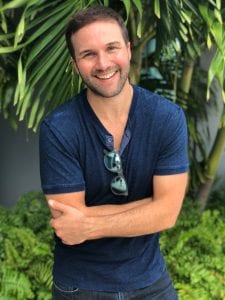
John Lee Dumas (JLD) is the founder and host of the award-winning podcast, Entrepreneurs on Fire.
JLD has interviewed over 3,000 of the world’s most successful entrepreneurs on his award-winning podcast Entrepreneurs On Fire, which has amassed over 100,000,000 listens and 3,000 5-star reviews since its launch in 2012. Past guests include Tony Robbins, Barbara Corcoran, and Gary Vaynerchuk.
JLD has spent the last 8 years studying and interacting with those who have reached the summit of business success, and he has created a 17-step roadmap that will guide YOU to financial freedom and fulfillment.
Love the show? Subscribe, rate, review, and share!
______________________________________
To listen to the EXTRA portion of this show go to RealEstateInvestingForWomenExtra.com
To see this program in video:
Search on Roku for Real Estate Investing 4 Women or go to this link: https://blissfulinvestor.com/biroku
On YouTube go to Real Estate Investing for Women
Moneeka Sawyer is often described as one of the most blissful people you will ever meet. She has been investing in Real Estate for over 20 years, so has been through all the different cycles of the market. Still, she has turned $10,000 into over $5,000,000, working only 5-10 hours per MONTH with very little stress.
While building her multi-million dollar business, she has traveled to over 55 countries, dances every single day, supports causes that are important to her, and spends lots of time with her husband of over 20 years.
She is the international best-selling author of the multiple award-winning books “Choose Bliss: The Power and Practice of Joy and Contentment” and “Real Estate Investing for Women: Expert Conversations to Increase Wealth and Happiness the Blissful Way.”
Moneeka has been featured on stages including Carnegie Hall and Nasdaq, radio, podcasts such as Achieve Your Goals with Hal Elrod, and TV stations including ABC, CBS, FOX, and the CW, impacting over 150 million people.

